#I went meta on my own story
Text
Quotation marks on names because those names are aliases. Different Resistance fics (OCs) focus on,
"Ray" - The direness of what Japan is like back then. Not meant to make you feel good or have fun when you read it
Feat. Ability drawbacks do exist, being forced to earn survival, and it's impossible to survive in Japan alone.

Himura - The discrimination of Meta Humans (treated as sub-normal) and being left behind over and over
Feat. Metas are called monsters, Bruce intervenes in the transportation for a Meta Human trading ring, and abandonment issues

"Boss" - A safe space and a kind hand can be everything to someone
Feat. Kudo breaks down after the sewer incident, an "If you have any respect for me" moment, and lots of boba.

Shiki - The whole package of the aboves, and what the Resistance was like, both on-duty and in moments of calm. Lots of ugly humanity whenever pressure starts to come down.
Feat. The first Three (+ OC) get to meme, Yoichi is the prettiest bastard in the world, Kudo is a snarky bitch obsessed with Disney, and Bruce is the parent of the Resistance. Reality will hit like a truck at times and the humor will be nowhere in sight then.

"Batman" - The irony of having a cliche, aesthetic Meta Ability, and no one (including the wielder) even realizing it exists for over half the story.
Feat. Dressing like a cool, hip vampire, Yoichi calling OC "Batman" unironically (much to Bruce's delight), and iron deficiencies.

#thats probably the most im gonna post about my resistance fic stuff and try stopping it here#ppl might try stealing even this#fanfic stuff is fun. its the crowd and lurkers thats gonna ruin it for me#spoilers#bnha#boku no hero academia#mha#my hero academia#oc#fic#fanfic#yoichi shigaraki#kudo#bruce#hikage shinomori#himura#worldbuilding#can u tell i liked one snippet more than the rest#*hint hint* Himura#this stuff is so fun but i wont post their stories. not anytime soon and probably never#so take these snippets. maybe one person will enjoy them#and to the person who chooses to pass this off as their own- you are perpetuating my problems.#but i dont know anyone who actually likes oc stories. no ones ever told me#well at least i know i can write a story and have fun with it#and i at least want to share a little bit of what im doing#not featured here is en and his kooky best friend#almost speedran the fastest divorce after his friend wanted to get married. he just went “Ok” (theyre both ace)#the himura snippet was originally 2x the length#if its not clear himura is. a tiny child. an orphan from the Meta smuggling ring#not as clear cuz it was cut more but “There's no reason at all” is for “why was everything this way?” (tag limit)
2 notes
·
View notes
Text
He is in fact not cool with his friends killing people he just can’t do shit about it and the fact that he thinks he can do smth about (and does!) when it comes to his kids is like a major point
#like one of the main#Idk if theme is the right word#but issues surrounding Batman in general and Gotham specifically#is the high standards he holds not just those closest to him to but also the people he controls#NOW DONT GET CAUGHT UP IN UR GUT REACTION CONTROL IS A STRONG WORD BUT IM USING IT FOR A REASON#like i think the fandomification of the batfamily and seeing every character as reliable in the way they tell their own stories#is making people forget that yes bruce lowkey controls them#like not in a mean way or whatever but as much as dick and Jason rebel and say ‘fuck you old man I have my own people to take care of’#at a snap of Bruce’s fingers where are they?#right back in Gotham#which ppl say is an issue with writing and I agree like they really just can’t take anyone away from Gotham#but THATS meta like the in universe conclusion is what creates in universe analysis#and these issues are being spoken about from an in universe pov#that was just me justifying my point anywayyyd#what im saying is that like#in conclusion Ppl are forgetting that Bruce is scary and still runs this shit lmao#like a few snappy quips about emotional distance and some ‘X deserves better’ fics is making yall forget shit like spyral#or at least how it went down and ended up today and what that says about the characters involved#it’s tragic and Ik we like to ignore that but like. when look at shit like the no killing rule#yes bruce thinks he’s being slighted or failing whenever his kids kill someone and they to an extent think that too which is why they don’t#do it#or at least partly#even for Jason that’s why the killing is not just what needs to be done it’s a form of rebellion for him#everyone who agrees jason should just leave Gotham but still present as pure rebellion and anger and spitting at Bruce don’t get why Jason#should leave is all I’m saying#that’s why Dick never got away#it’s still all about Bruce#even if we don’t want it to be#reading this back it’s disjointed as hell but I’m not fixing it if u get it ily heh just a peek into my dark mind#if u don’t it’s not ur fault not everyone can withstand the alphas prowess…
2 notes
·
View notes
Note
I just want you to know that I so deeply cherish all your untamed and murderbot (and raksura) thoughts that I started reading ORV just so I can get MORE of your fandom thoughts. I wanna be able to understand your new posts!!
this is so sweet 😭 thank you i'm flattered!! there are some really fabulous posts in this fandom, so i'm excited for you to experience them! my own posts are fairly shallow because i haven't done a reread and the story is so long i already can't remember most of it haha, but the fandom seems pretty active on here so it's gonna be a while before i run out of other people's fanart and meta to reblog. standard disclaimer that you read orv at your own risk and i will not be held responsible for any feelings you may or may not experience in the course thereof. godspeed <3
#wow what an incredibly lovely thing to say thank you 😭😭😭#i do think it's funny how i almost never rec anything‚ i just say unhinged shit & people go okay i need to know what that means.#i don't know that i personally would actually recommend orv to people. my own experience reading it was kind of weird#and i did not have the like. spiritual breakthrough that other people seem to have had#i would recommend that if you are going to read it...take your time with it if possible !#i was so impatient to start reading meta that i sprinted through a book that's more of a marathon than a sprint#which was utterly exhausting as you might imagine#and idk manage your expectations i guess bc i went in with expectations that were basically impossible to fulfill#just based on the way other people talk about it#i am either too mentally ill not mentally ill enough or the wrong kind of mentally ill to be affected by this story in the way that#other people seem to have been#still really liked the story! just don't have a new lease on life or whatever lol. which is fine! my current lease hasn't expired!#anyway i would love for you to have context for my shitpost on lee jihye's theory on the joongdok lovechild. if nothing else.#it's my chef d'œuvre#asks#not anon#NICE SHIT#will add other indexing tags later#new affirmation to say to myself in the mirror every morning: YOUR THOUGHTS ARE DEEPLY CHERISHED
3 notes
·
View notes
Text
[NEVERAFTER FINALE SPOILERS] I have kept up with neverafter since it first released and I’m SOOO sad to see it over but I loved it so much. I think it’s hilarious that emily committed to Ylfa x Pinocchio at the end since she’s been hinting at it from like the very start. It’s so funny to me. Good for them!!! Absolute shit charisma gf x absolutely insane charisma bf!!!
#sure I can have opinions on their stories but [not to get meta] if it was scripted and perfect it defeats the point#the point is it’s THEIR story now. they can be as silly and stupid or serious and fun as they want#it’s not up to us to force them. they live happily. in their own way!#dimension 20#neverafter spoilers#neverafter#ok actually I’m not done#Pinocchio and ylfa were the only kids in the group and they went through SOOO much it’s insane. l#but I loved the moments where they could just hang and be kids it was sooo cute. snowball fights!!!!!#rosamund was just a teen too at 18 but u get the gist. the kids were like 12#also Rosamund being there for ylfa hurt so good [hits in the sibling issues]#okay one last thing. narratively i think it should’ve ended before we saw their epilogues. however that is NOT how campaigns work#at least in my groups. you get your epilogues! you close out YOUR story!#but I will still enjoy seeing the fics and art of possible AUS
3 notes
·
View notes
Text
I have a theory!
Duke groaned, his head tumping against his desk on his side of the room. He had heard these words often enough by now to know that his roommate was going to start ranting about something strange but weirdly fascinating again.
The last time his roommate started with that, he went on a rant how all rich people have a secret basement below their homes or some secretly identities with a bulletpoint list of what to look out for as a warning. Which Duke had a hard time not laughing about as he thought about Bruce, who ended up checking a lot of the bulletpoints.
"Danny what is it now?" Duke ended up asking after all. He knew he wouldn't be able to stop his roommate. No one aside from his sister apparently could, Danny even gave her number to Duke as an emergency number in case Danny ever gets so caught up in his own thoughts that even he himself couldn't stop himself anymore. Yeah that was weird to watch Danny trying to stop himself, but it was fascinating that his sister only needed to say his name twice over the speaker.
"Duke hear me out!" Okay of to a good start, so this meant Danny wasn't a hundred percent behind his own theory.
"Red Hood is a ghost or part ghost!"
If Duke had been drinking something, he would have taken a spit take here. For some reasons he had the image of Jason wearing a bed sheet saying the most deadpan 'Boo' in his head when Danny said that. He coughed, trying to hide that amusement. "What makes you say that?"
"You know how you 'saw' that I am a 'Meta'?" Danny ask him in return and Duke nodded still feeling a but weird with how Danny sounded when he refred to himself as Meta but also vividly remembering how his roommate pretty much blinded him on the day he moved into the dorms. "I can kind of see something similar. Like I explained how I have a ghost sense and all that, right?"
"Yea, you did." Duke nodded along, he new his roommate became a Meta through a lab accident. Once Duke had asked him and they had the cleared the air about both of them being Metas, Danny had somewhat opened up a bit on his whole weird family and Duke thought his family wasn't normal but compared to the Fentons the Batfamily might as well could be.
"Well last night I ran into him when I went scrap collecting for my engineering project!"
"DANNY!" Duke couldn't help but scowl. One the school was providing materials, Danny didn't need to do that and two, if he met Red Hood aka Jason that meant Danny wandered far enough to end up near or in Crime Alley! He would need to bug Jason later to find out more about that.
"I know, I know." His roommate waved him off. "Anyway, my ghost sense tingled. Soooo Red Hood got to be a ghost or part ghost, considering he hit a wall instead of phasing through it when he chased me..."
"Danny!" Duke scowled him again, hidding his amusement behind it. Now, he really had to get THAT story out of Jason later, plus he wanted to see if there maybe was possible video proof of Jason running into a wall chasing after Danny.
"Anyway! I got more than just that! Listen here, you know how I told you about some of my parents' inventions..." Danny instead continued finally starting his rant.
#danny fenton#danny phantom#dp x dc#dpxdc#dcxdp#crossover#duke thomas#jason todd#duke and danny are roommates#danny has theories#and duke has to listen to them#some of them are really funny#he will use them to tease the rest of the batfam#random late night thoughts#stress writing#prompt idea
1K notes
·
View notes
Text
Unpopular opinion, probably.
So I've read many metas, and thought a lot about it and have come to my own personal conclusion about the final 15.
I'm taking it at face value.
Because it was the most human Crowley and Aziraphale have probably ever been and I think that is at least part of the point. Love makes people stupid and they are navigating a very human thing in very unhuman circumstances, and it's hard enough to do as a human in human circumstances!
I think Aziraphale believed the Metatron about Crowley bc he was expecting the worst when TM mentioned Crowley but instead got the one thing he wanted most (him and Crowley together and safe, not Crowley being an angel. ) Crowley was absolutely the carrot here. (and no I do not think Crowley would have been safe or happy, but that's besides the point.) I can't tell you how many times I've believed patently ridiculous things because I wanted to believe them so badly even though if I was looking at the same situation objectively from an outside POV I would see how ridiculous it was, so I totally get it. This isn't to say I think Azi had a real choice to go to Heaven or not and I think he did understand that as well, but I get the temptation the Metatron threw out to him, I really do.
As for Aziraphale literally saying all the wrong things to try and get Crowley to come with him? Um yeah been there done that too, the nerves take over, the brain shuts off, the mouth goes into autopilot pulling stuff out its ass, and "WITAF did I just say?" happens.
Crowley not taking any of it well and only hearing what he expected to hear (I'm not good enough for you bc I'm a demon and you only really want me if I can be an angel) *and* also being more able to see through heavens bullshit bc he has lived it, and can see it from the outside, *and* all whilst being the most honest and vulnerable he has ever been with Aziraphale in 6,000 plus years (or in fact possibly to anyone, ever. the closest before this admitting he was lonely to Azi during the Job minisode,) *then* hearing what he took to be the same Heaven will save us line from Azi was enough to trigger a massive bout of RSD and a broken heart. Everything was supposed to "vavoom and sorted! " and instead the stupid awning broke and everything went wrong. I think I've said it before that at this point Crowley can't hear anything over the sound of his heart breaking into a million pieces.
That's a whole lot to pack into the brief moments before Azi has to leave with the Metatron (who let's be honest was rushing him before he could change his mind) esp when neither of them are used to discussing their relationship openly. They didn't have time to think, to ask questions, to share information, (like hey guess what really happened to Gabriel?) Crowley tried to communicate as much as he could about his feelings with the kiss but Azi didn't have the time to properly process all that and said the wrong thing again and Crowley was rejected (he thought) again and it all just went so very wrong. You can't fix a 6,000 year relationship in 15 minutes, you just can't no matter what the story books say.
It's about two people wanting the same thing but not being able to get it (yet) because of circumstances and personalities. All of S2 was about them seeming to be closer than ever (and in many ways they were) but really they were opposed at almost every turn. (in RL not the minisodes, those actually showed them working together and coming out okay mostly, if you don't count wee Morag or Crowley getting dragged to hell) The way they both handled the Gabriel situation, how they both worked to solve the mystery, even how they tried to make Nina and Maggie fall in love were all either done alone, or in opposite ways. I've said it before and I'll say it again, as it was pointed out right in ep1, their exactlies aren't the same and until they are, they aren't going to be able to be together. The one time they did work together in the season, they produced a 25 lazuri miracle. That is the point of the final 15, and the whole season 2 in my opinion.
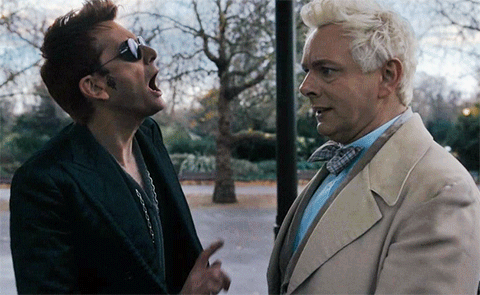
They'll get there in the end though!
#aziracrow#aziraphale loves crowley#crowley loves aziraphale#crowphale#good omens#aziraphale#crowley#ineffable husbands#aziraphale x crowley#aziraphale good omens#crowley x aziraphale#neil gaiman#anthony j crowley#crowley good omens#gomens#good omens 2#az fell#ineffable spouses#final 15#final fifteen#good omens meta#the final fifteen#aziracrow good omens
438 notes
·
View notes
Text
Post-Hoot with Dana Terrace!
Dana’s put over 200 hours into games she’s missed since the finale; Octopath Traveler, Little Nightmares, etc. Sarah Nicole-Robles cried harder than she ever did when she said I learned a language I’ll never forget, a whole chapter of my life is over, during the King-ceanera. She said the line once and was suddenly sobbing because of how meta it was.
Rebecca has a ‘sona during the bit with Barcus in the epilogue sequence. Cissy also cried when watching with her family, her kids asked her about it; Sarah was really excited as she watched the finale.
No sequel happening, but we can always hope; Dana would like to do more, but Disney owns the IP and needs to give them permission. Dana knew the prequel line in the finale was ham-fisted as hell but still went with it because she was pissed (she said Fuck to express her rage). Rebecca went back to the Anger phase of grief after watching the finale after realizing what they missed, but Sarah was also in Acceptance because it was hard to regret something that ended so well.
Dana doesn’t cry that much, but TJ’s remix in the soundtrack made her cry. Dana brought back everyone for BBBYYYEEEEEEE, noting this was every character’s last line, and wished Hooty had more lines. Alex improvised a cut line after the Bye with Hooty expressing appreciation for the finale and readiness for his spin-off.
Dana won’t say much in hopes she’ll get to do more for TOH in the future; A Youtube reviewer (shoutout to all, Zachary Ax, Man of a Thousand Thoughts, Rebecca herself), the Third Bill got it right on Hooty, and Dana won’t be more specific about that.
They found out about the shortening during S2; They had an ending in mind that Dana had in mind since development, but it needed too much setup and so they couldn’t pull it off. All of Season 2A was written before knowing the cancellation; Follies at the Coven Day Parade was the first episode fully written knowing the show was shortened, hence the tonal change. The Galdorstones was an arc Dana planned more on, as well as the Coven Heads; Bat Queen; It was a hard situation choosing what to leave out.
There weren’t whole episodes written that had to be trashed; Just one-sentence ideas on a whiteboard never fully outlined or scripted. But Dana is still happy with what came out, because it was pretty damn cool.
Rebecca Rose once saw someone with a King sweatshirt like hers at Disneyland and said hi, but they just side-eyed her and didn’t respond; Despite this, Rebecca hopes they had a happy day and believes they were just having a bad time. Sarah joked about not being so forgiving.
String Bean’s inspiration: Owlbert is in the title of the show, String Bean indeed was there the whole time! The S wasn’t completely intentional at first, but Dana flipped the logo around and figured it out. When making the first episode, the logo wasn’t finalized. They always liked the idea of Luz being connected to snakes, it’s what she brought to school and they liked her reclaiming something she terrorized her classmates with. The Snake-Shifter idea specifically; Zach Marcus just said “Snake-Shifter” as they brainstormed ideas and Dana, being a sucker for lame puns, was sold.
That was indeed Dana being represented as a student in the epilogue! She was Beastkeeping and Oracle; Dana can see the future of the show, and really likes animals. Raine’s palisman was indeed hidden within the violin’s design; Hunter and Dell worked to fix the palismen after Raine broke it trying to stop Belos. The violin is more akin to the staff, anyhow. Dana considered responding to a question about general Caleb, Evelyn, and Flapjack lore, but Sarah insisted she stay silent in case they get to answer it as an actual story later.
Dana liked to think while writing Thanks to Them; No, Evelyn’s spirit isn’t in Flapjack. But to Philip, he saw Flapjack as the culmination of the corruption in his brother Caleb; He saw Flapjack, if it weren’t for YOU. You can see a hint of it in Masha’s story, Evelyn entices Caleb with Flapjack, who was Caleb’s introduction to magic. Evelyn was probably disguised as a human, and trusted Caleb for seeming reasonable and less violent. Perhaps like Dog owners passing each other by and suddenly becoming friends over this.
Evelyn and Caleb’s relationship was sweet, from platonic curiosity to romantic. Eda doesn’t know she’s descended from them, nor does Hunter; And Dana has more to say, but will keep it hidden. Luz will stay the majority of her stay in the isles as she goes to college. Camila bought the shack leading to the human world, which allowed Luz to visit during holidays, weekends, etc.
They never got to explore it, but it could’ve originally been the home of Philip and Caleb, long abandoned; Eda emerges after discovering the portal. In the next thirty years, she fixes up the shack as she builds the Owl House. Dana also advised fans to google Death of the Author, since she’s technically no longer working on the show, and thus gives permission for fans to write their own answers.
Eda became the Owl Lady before Owlbert, due to the curse; They planned to do an episode where Eda learned palismen carving with Dell, and how Eda reclaimed the Owl identity to carve Owlbert. Dana stills has the outline of that episode in her head…
According to Rebecca, Caleb and Philip’s graves were in the basement of the shack, based on this church in New Haven Dana passed by every day on her way to school (Gravesfield is based on some places in Connecticut). However, Dana realized the graves didn’t fit into the story. They also had an ‘original’ Belos design for him taking over animals. Marina Gardner did some amazing Belos designs, and Thanks to Them alluded to it.
The Portal’s eye comes from the Titan’s missing eye!!! Hunter is bisexual, Willow is pansexual, this is how Dana always wrote and imagined them in her mind, but it’s not explicitly stated so technically it’s more headcanon. Dana noted how some people just picked it up. Dana likes to think Amity and Lilith rekindled their student-mentor relationship. Having worked in the library, Amity was interested in Lilith’s knowledge of history. Dana suggested to Zarya(?) from the design team to add notes to Lilith’s museum blueprints. A helicopter passed over and they joked it was Disney trying to stop spoilers.
Cissy only got her lines and didn’t know any other details about the finale, to Dana’s surprise; Dana explained that people not getting a full script is due to the pandemic. Before quarantine, actors would get the full script. They have to rely on Eden Riegel and Dana for context a lot. Bosook Coburn spoiled Luz’s death to Rebecca Rose during the celebration party. They came up with a lot of designs for dying Luz, trying to figure out how they can hollow out her head how much. Dana mentions it’s up to the showrunner to show how much they want to the actors.
Thanks to Sarah, they kept in Luz saying her own SFX during her fight with Eda in O Titan, Where Art Thou; She heard someone do it as part of the mock script and wanted it. When Dana voiced Eda and Luz at the end, Dana was crying. There’s a recording of Season 2B and Season 3 of Dana doing a voice-over of the script to get approved by executives.
Dana clarified everyone would’ve had more of a chance to talk with each other, such as Hunter and Amity; Hunter would’ve talked to Vee, as well as more human realm kids, literally everyone would’ve had a little more time with each other. Dana loves Luz and Hunter’s sibling dynamic. Dana was sorry they couldn’t have Luz and Raine hang out, but they had the Hexsquad storyline. Luz finished high school in the human world, with the renewed motivation that she’ll go back to the isles. Knowing she has a safe space outside of high school made it more bearable, as was the case for Dana growing up.
Cissy brought up Gus’ hair in the epilogue, which she loved; Emmy Cicierga did the design for Gus and Raine. Harpy Lilith was by Emmy; Dana did Emira, Eberwolf, and Skara’s timeskip designs. The name of the Titan is unpronounceable for humans.
Dana can’t say much about the Archivists; The Collector never had a flash-forward design, as they age much more slowly than everyone else. Maybe the Collector got just a tiny bit taller. The idea of the Collector came from creepy dolls, as well as a nightmare; John Bailey Owen had a google folder filled with cool references of creepy dolls with a starry aesthetic, liminal minimalist nightmare-scape. They knew who the Collector was gonna be, what role they’d play, but the vibe still needed to be decided.
Dana confirmed the Collector was always a part of the show before the shortening, and they solidified their placement after the announcement. The Collector has indeed stayed connected with the others, visits occasionally. Dana has seen fan comics on this and teared up.
Hooty doesn’t have to be vacated from the Owl House if he doesn’t want to; When the door isn’t active, Hooty could be present. The new portal can probably fold up, and Hooty is busy as a curator for Hooty’s new museum.
Dana said Raine and Eda’s business is their business; Not all love stories end in marriage. It’s their thing and it doesn’t diminish any love, but they do live in the Owl House together (Raine moved in).
Mattholomule getting a palisman is something Zach Marcus can answer, since he made the character and Dana respects the lore he made. It’s hard to say for Dana if Vee and Masha are dating, since Masha didn’t show up in the finale, but Vee definitely has a crush on them. Again, Dana encourages the Death of the Author approach, if the headcanon makes you happy.
Alador and Odalia got officially divorced after the finale, and the kids happily lived away from her. They might visit her if they have the energy, but also recognize she’s a toxic influence they can cut off at any point. Dana gave a shoutout to Rachel McFarlane’s voice acting, praising her performance for Odalia.
In regards to the tower King was born in, Dana has an answer; It was related to a character we all know, who now may have amnesia.
There was a plan to explore Gus and Willow’s glowing eyes, and do it for other characters; Amity wasn’t going to have that, strong emotions are indeed connected to magic. It was mostly a worldbuilding magic rule they could’ve expanded on, that Dana wishes she did early in the story.
In the boards, Dawn Han(?) did Clouds on the Horizon, and did the scene of Amity and the twins hiding in the factory as their parents talk about the Abomatons, Alador is worried since it seems like a tad much. Alador had T-rex arms in the storyboard, and it reminded Dana of Remy from Ratatouille, so when they got to the scene of them looking into Alador’s lab, Ratador was drawn in his place as a joke. Dana laughed so hard she decided to keep it in, with Dana handwaving it as Alador’s palisman.
According to Dana, a show should be appreciated for as it is; But the other way to enjoy it, under the context it was made, is also important to her; Both ways are valid. It was easier for Sarah to voice depressed Luz since she was also depressed. The writers preferred to put their feelings into the show, VS a more happy-go-lucky approach as others did; It was kind of dark for a bit, especially during quarantine. Sarah felt her own experience validated with Luz’s depression, but she and Dana appreciated the balance of having a happy ending too.
What made the crew hopeful was knowing the characters would always have a happy ending; Luz could continue her studies in full-force, a new family. They KNEW it would end happy. Dana acknowledged how the fandom misinterpreted “I hate the term happy endings,” and Sarah knew about the quincenera when asked during previous Post-Hoots, but couldn’t answer.
Rebecca commissioned 3D-printed Funko Pops of S2A Lilith and S1 Luz, and gave them to the others as gifts; Rebecca didn’t know about Avi’s appearance until two days before the Post-Hoot, otherwise she would’ve had a Funko of Raine made. Dana’s stand for Luz had to be made with painter’s tape (she appreciated it) due to Rebecca running out of the other kind, and planned to place it beside her Peabody award. Elizabeth Grullon, Camila’s VA, had to call her mom in the middle of a session to translate her line about maduros into English.
Cissy clarified this wasn’t intended to be the final Post-Hoot! And the video was ended with a BBBBYYYEEEEE!!!!!
#the owl house#dana terrace#caleb wittebane#evelyn clawthorne#boiling isles titan#edalyn clawthorne#eda clawthrone#raine whispers#raeda#palismen#the owl house hunter#willow park#bisexual#pansexual#post Hoot
2K notes
·
View notes
Text
It was all downhill after the Cuecat
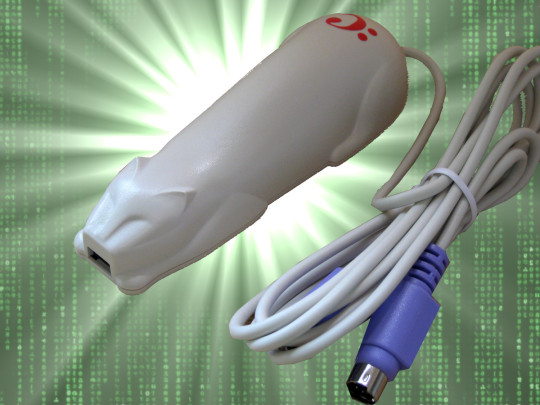
Sometime in 2001, I walked into a Radio Shack on San Francisco’s Market Street and asked for a Cuecat: a handheld barcode scanner that looked a bit like a cat and a bit like a sex toy. The clerk handed one over to me and I left, feeling a little giddy. I didn’t have to pay a cent.
The Cuecat was a good idea and a terrible idea. The good idea was to widely distribute barcode scanners to computer owners, along with software that could read and decode barcodes; the company’s marketing plan called for magazines and newspapers to print barcodes alongside ads and articles, so readers could scan them and be taken to the digital edition. To get the Cuecat into widespread use, the company raised millions in the capital markets, then mass-manufactured these things and gave them away for free at Radio Shacks around the country. Every Wired and Forbes subscriber got one in the mail!
That was the good idea (it’s basically a prototype for today’s QR-codes). The terrible idea was that this gadget would spy on you. Also, it would only work with special barcodes that had to be licensed from the manufacturer. Also, it would only work on Windows.
https://web.archive.org/web/20001017162623/http://www.businessweek.com/bwdaily/dnflash/sep2000/nf20000928_029.htm
But the manufacturer didn’t have the last word! Not at all. A couple of enterprising hardware hackers — Pierre-Philippe Coupard and Michael Rothwell — tore down a Cuecat, dumped its ROM, and produced their own driver for it — a surveillance-free driver that worked with any barcode. You could use it to scan the UPCs on your books or CDs or DVDs to create a catalog of your media; you could use it to scan UPCs on your groceries to make a shopping list. You could do any and every one of these things, because the Cuecat was yours.
Cuecat’s manufacturer, Digital Convergence, did not like this at all. They sent out legal demand letters and even shut down some of the repositories that were hosting alternative Cuecat firmware. They changed the license agreement that came with the Cuecat software CD to prohibit reverse-engineering.
http://www.cexx.org/cuecat.htm
It didn’t matter, both as a practical matter and as a matter of law. As a practical matter, the (ahem) cat was out of the bag: there were so many web-hosting companies back then, and people mirrored the code to so many of them, the company would have its hands full chasing them all down and intimidating them into removing the code.
Then there was the law: how could you impose license terms on a gift? How could someone be bound by license terms on a CD that they simply threw away without ever opening it, much less putting it in their computer?
https://slashdot.org/story/00/09/18/1129226/digital-convergence-changes-eula-and-gets-cracked
In the end, Cuecat folded and sold off its remaining inventory. The early 2000s were not a good time to be a tech company, much less a tech company whose business model required millions of people to meekly accept a bad bargain.
Back then, tech users didn’t feel any obligation to please tech companies’ shareholders: if they backed a stupid business, that was their problem, not ours. Venture capitalists were capitalists — if they wanted us give to them according to their need and take from them according to their ability, they should be venture communists.
Last August, philosopher and Centre for Technomoral Futures director Shannon Vallor tweeted, “The saddest thing for me about modern tech’s long spiral into user manipulation and surveillance is how it has just slowly killed off the joy that people like me used to feel about new tech. Every product Meta or Amazon announces makes the future seem bleaker and grayer.”
https://twitter.com/ShannonVallor/status/1559659655097376768
She went on: “I don’t think it’s just my nostalgia, is it? There’s no longer anything being promised to us by tech companies that we actually need or asked for. Just more monitoring, more nudging, more draining of our data, our time, our joy.”
https://twitter.com/ShannonVallor/status/1559663985821106177
Today on Tumblr, @wilwheaton responded: “[T]here is very much no longer a feeling of ‘How can this change/improve my life?’ and a constant dread of ‘How will this complicate things as I try to maintain privacy and sanity in a world that demands I have this thing to operate.’”
https://wilwheaton.tumblr.com/post/698603648058556416/cory-doctorow-if-you-see-this-and-have-thoughts
Wil finished with, “Cory Doctorow, if you see this and have thoughts, I would LOVE to hear them.”
I’ve got thoughts. I think this all comes back to the Cuecat.
When the Cuecat launched, it was a mixed bag. That’s generally true of technology — or, indeed, any product or service. No matter how many variations a corporation offers, they can never anticipate all the ways that you will want or need to use their technology. This is especially true for the users the company values the least — poor people, people in the global south, women, sex workers, etc.
That’s what makes the phrase “So easy your mom can use it” particularly awful “Moms” are the kinds of people whose priorities and difficulties are absent from the room when tech designers gather to plan their next product. The needs of “moms” are mostly met by mastering, configuring and adapting technology, because tech doesn’t work out of the box for them:
https://pluralistic.net/2022/05/19/the-weakest-link/#moms-are-ninjas
(As an alternative, I advocate for “so easy your boss can use it,” because your boss gets to call up the IT department and shout, “I don’t care what it takes, just make it work!” Your boss can solve problems through raw exercise of authority, without recourse to ingenuity.)
Technology can’t be understood separately from technology users. This is the key insight in Donald Norman’s 2004 book Emotional Design, which argued that the ground state of all technology is broken, and the overarching task of tech users is to troubleshoot the things they use:
https://pluralistic.net/2020/04/29/banjo-nazis/#cuckoos-egg
Troubleshooting is both an art and a science: it requires both a methodical approach and creative leaps. The great crisis of troubleshooting is that the more frustrated and angry you are, the harder it is to be methodical or creative. Anger turns attention into a narrow tunnel of brittle movements and thinking.
In Emotional Design, Norman argues that technology should be beautiful and charming, because when you like a technology that has stopped working, you are able to troubleshoot it in an expansive, creative, way. Emotional Design was not merely remarkable for what it said, but for who said it.
Donald Norman, after all, was the author of the hugely influential 1998 classic The Design of Everyday Things, which counseled engineers and designers to put function over form — to design things that work well, even if that meant stripping away ornament and sidelining aesthetics.
https://www.basicbooks.com/titles/don-norman/the-design-of-everyday-things/9780465050659/
With Emotional Design, Norman argued that aesthetics were functional, because aesthetics primed users to fix the oversights and errors and blind spots of designers. It was a manifesto for competence and humility.
And yet, as digital technology has permeated deeper into our lives, it has grown less configurable, not more. Companies today succeed where Cuecat failed. Consolidation in the online world means that if you remove a link from one search engine and four social media sites, the material in question vanishes for 99% of internet users.
It’s even worse for apps: anyone who succeeds in removing an app from two app stores essentially banishes it from the world. One mobile platform uses technological and legal countermeasures to make it virtually impossible to sideload an app; the other one relies on strong-arm tactics and deceptive warnings to do so.
That means that when a modern Coupard and Rothwell decides to unfuck some piece of technology — to excise the surveillance and proprietary media requirements, leaving behind the welcome functionality — they can only do so with the sufferance of the manufacturer. If the manufacturer doesn’t like an add-on, mod, plug-in or overlay, they can use copyright takedowns, anticircumvention law, patent threats, trademark threats, cybersecurity law, contract law and other “IP” to simply banish the offending code:
https://locusmag.com/2020/09/cory-doctorow-ip/
Many of these laws carry dire penalties. For example, distributing a tool that bypasses an “access control” so that you can change the software on a gadget (say, to make your printer accept third-party ink) is a felony under Section 1201 of the DMCA, punishable by a $500k fine and a 5-year prison sentence.
If Cuecat’s manufacturers had simply skinned their firmware with a thin scrim of DRM, they could have threatened Coupard and Rothwell with prison sentences. The developments in “IP” over the two decades since the Cuecat have conjured up a new body of de facto law that Jay Freeman calls “felony contempt of business model.”
Once we gave companies the power to literally criminalize the reconfiguration of their products, everything changed. In the Cuecat era, a corporate meeting to plan a product that acted against its users’ interests had to ask, “How will we sweeten the pot and/or obfuscate our code so that our users don’t remove the anti-features we’re planning to harm them with?”
But in a world of Felony Contempt of Business Model, that discussion changes to “Given that we can literally imprison anyone who helps our users get more out of this product, how can we punish users who are disloyal enough to simply quit our service or switch away from our product?”
That is, “how can we raise the switching costs of our products so that users who are angry at us keep using our products?” When Facebook was planning its photos product, they deliberately designed it to tempt users into making it the sole repository of their family photos, in order to hold those photos ransom to keep Facebook users from quitting for G+:
https://www.eff.org/deeplinks/2021/08/facebooks-secret-war-switching-costs
Companies claim that their lock-in strategies are about protecting their users: “Move into our walled garden, for it is a fortress, whose battlements bristle with fearsome warriors who will defend you from the bandits who roam the countryside”:
https://locusmag.com/2021/01/cory-doctorow-neofeudalism-and-the-digital-manor/
But this “feudal security” offers a terrible temptation to the lords of these fortresses, because once you are inside those walls, the fortress can easily be converted to a prison: these companies can abuse you with impunity, for so long as the cost of the abuse is less than the cost of the things you must give up when you leave.
The tale that companies block you from overriding their decisions is for your own good was always dubious, because companies simply can’t anticipate all the ways their products will fail you. No design team knows as much about your moment-to-moment struggles as you do.
But even where companies are sincere in their desire to be the most benevolent of dictators, the gun on the mantelpiece in Act I is destined to go off by Act III: eventually, the temptation to profit by hurting you will overpower whatever “corporate ethics” once stayed the hand of the techno-feudalist who rules over your fortress. Under feudal security, you are one lapse in corporate leadership from your protector turning into your tormentor.
When Apple launched the Ipad 12 years ago, I published an editorial entitled “Why I won’t buy an iPad (and think you shouldn’t, either),” in which I predicted that app stores would inevitable be turned against users:
https://memex.craphound.com/2010/04/01/why-i-wont-buy-an-ipad-and-think-you-shouldnt-either/
Today, Apple bans apps if they “use…a third-party service” unless they “are specifically permitted to do so under the service’s terms of use.” In other words, Apple specifically prohibits developers from offering tools that displease other companies’ shareholders, no matter whether this pleases Apple customers:
https://developer.apple.com/app-store/review/guidelines/#intellectual-property
Note that clause 5.2.2 of Apple’s developer agreement doesn’t say “You mustn’t violate a legally enforceable term of service.” It just says, “Thou shalt not violate a EULA.” EULAs are garbage-novellas of impenetrable legalese, larded with unenforceable and unconscionable terms.
Apple sometimes will displease other companies on your behalf. For example, it instituted a one-click anti-tracking setting for Ios that cost Facebook $10 billion in a matter of months:
https://www.cnbc.com/2022/02/02/facebook-says-apple-ios-privacy-change-will-cost-10-billion-this-year.html
But Apple also has big plans to expand its margins by growing its own advertising network. When Apple customers choose ad-blockers that block Apple’s ads, will Apple permit it?
https://www.wired.com/story/apple-is-an-ad-company-now/
The problem with app stores isn’t whether your computing experience is “curated” — that is, whether entities you trust can produce collections of software they vouch for. The problem is when you can’t choose someone else — when leaving a platform involves high switching costs, whether that’s having to replace hardware, buy new media, or say goodbye to your friends, customers, community or family.
When a company can leverage its claims to protecting you to protect itself from you — from choices you might make that ultimately undermine its shareholders interests, even if they protect your own interests — it would be pretty goddamned naive to expect it to do otherwise.
More and more of our tools are now digital tools, whether we’re talking about social media or cars, tractors or games consoles, toothbrushes or ovens:
https://www.hln.be/economie/gentse-foodboxleverancier-mealhero-failliet-klanten-weten-van-niets~a3139f52/
And more and more, those digital tools look more like apps than Cuecats, with companies leveraging “IP” to let them control who can compete with them — and how. Indeed, browsers are becoming more app-like, rather than the other way around.
Back in 2017, the W3C took the unprecedented step of publishing a DRM standard despite this standard not having anything like the consensus that is the norm for W3C publications, and the W3C rejected a proposal to protect people who reverse-engineered that standard to add accessibility features or correct privacy defects:
https://www.eff.org/deeplinks/2017/09/open-letter-w3c-director-ceo-team-and-membership
And while we’re seeing remarkable progress on Right to Repair and other policies that allow the users of technology to override the choices of vendors, there’s another strong regulatory current that embraces companies’ ability to control their users, in the hopes that these big companies will police their users to prevent bad stuff, from controversial measures like filtering for copyright infringement to more widely supported ideas like blocking child sex abuse material (CSAM, AKA “child porn”).
There are two problems with this. First, if we tell companies they must control their users (that is, block them from running plugins, mods, skins, filters, etc) then we can’t tell them that they must not control their users. It comes down to whether you want to make Mark Zuckerberg better at his job, or whether you want to abolish the job of “Mark Zuckerberg.”
https://doctorow.medium.com/unspeakable-8c7bbd4974bc
Then there’s the other problem — the gun on the mantelpiece problem. If we give big companies the power to control their users, they will face enormous internal pressure to abuse that power. This isn’t a hypothetical risk: Facebook’s top executives stand accused of accepting bribes from Onlyfans in exchange for adding performers who left Onlyfans to a terrorist watchlist, which meant they couldn’t use other platforms:
https://gizmodo.com/clegg-meta-executives-identified-in-onlyfans-bribery-su-1849649270
I’m not a fan of terrorist watchlists, for obvious reasons. But letting Facebook manage the terrorist watchlist was clearly a mistake. But Facebook’s status as a “trusted reporter” grows directly out of Facebook’s good work on moderation. The lesson is the same as the one with Apple and the ads — just because the company sometimes acts in our interests, it doesn’t follow that we should always trust them to do so.
Back to Shannon Vallor’s question about the origins of “modern tech’s long spiral into user manipulation and surveillance” and how that “killed off the joy that people like me used to feel about new tech”; and Wil Wheaton’s “constant dread of ‘How will this complicate things as I try to maintain privacy and sanity.”
Tech leaders didn’t get stupider or crueler since those halcyon days. The tech industry was and is filled with people who made their bones building weapons of mass destruction for the military-industrial complex; IBM, the company that gave us the PC, built the tabulating machines for Nazi concentration camps:
https://en.wikipedia.org/wiki/IBM_and_the_Holocaust
We didn’t replace tech investors and leaders with worse people — we have the same kinds of people but we let them get away with more. We let them buy up all their competitors. We let them use the law to lock out competitors they couldn’t buy, including those who would offer their customers tools to lower their switching costs and block abusive anti-features.
We decided to create “Felony Contempt of Business Model,” and let the creators of the next Cuecat reach beyond the walls of their corporate headquarters and into the homes of their customers, the offices of their competitors, and the handful of giant tech sites that control our online discourse, to reach into those places and strangle anything that interfered with their commercial desires.
That’s why plans to impose interoperability on tech giants are so exciting — because the problem with Facebook isn’t “the people I want to speak to are all gathered in one convenient place,” no more than the problem with app stores isn’t “these companies generally have good judgment about which apps I want to use.”
The problem is that when those companies don’t have your back, you have to pay a blisteringly high price to leave their walled gardens. That’s where interop comes in. Think of how an interoperable Facebook could let you leave behind Zuckerberg’s dominion without forswearing access to the people who matter to you:
https://www.eff.org/interoperablefacebook
Cuecats were cool. The people who made them were assholes. Interop meant that you could get the cool gadget and tell the assholes to fuck off. We have lost the ability to do so, little by little, for decades, and that’s why a new technology that seems cool no longer excites. That’s why we feel dread — because we know that a cool technology is just bait to lure us into a prison that masquerades as a fortress.
Image:
Jerry Whiting (modified)
https://en.wikipedia.org/wiki/File:CueCat_barcode_scanner.jpg
CC BY-SA 3.0:
https://creativecommons.org/licenses/by-sa/3.0/deed.en
[Image ID: A Cuecat scanner with a bundled cable and PS/2 adapter; it resembles a plastic cat and also, slightly, a sex toy. It is posed on a Matrix movie 'code waterfall' background and limned by a green 'supernova' light effect.]
7K notes
·
View notes
Text
Baraqiel and Azazel
Disclaimer: DO NOT ask Neil Gaiman to confirm or deny any of this. He doesn't want you to ask. I don't want you to ask.
SO DON'T ASK.
Edit: Neil confirmed this theory and it's not my fault: see the reblog
Now, on with the meta.
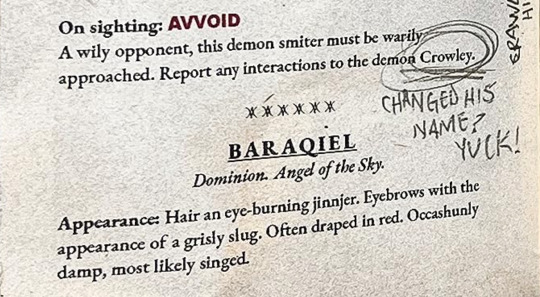
Thesis and evidence below the cut:
Dominion...
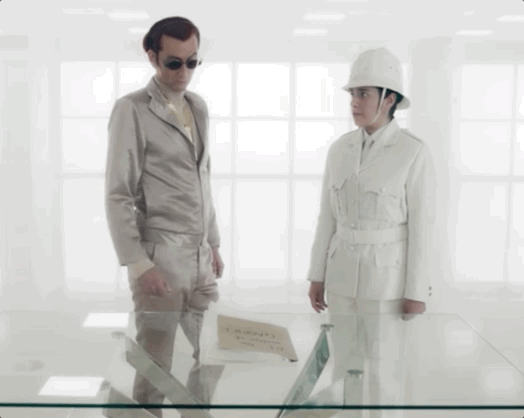
Angel of the Sky...

Hair an eye-burning ginger, eyebrows like grisly slugs, often draped in red…

Occasionally damp...
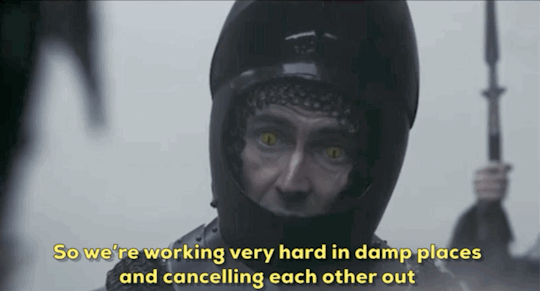
Most likely singed…
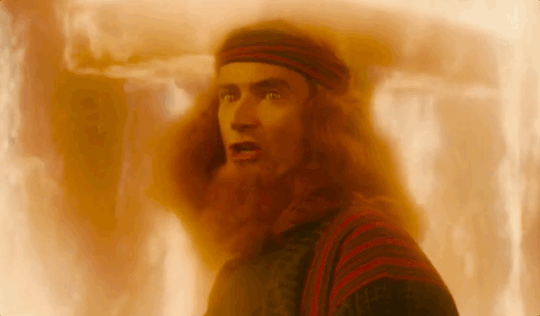
Most likely singed…
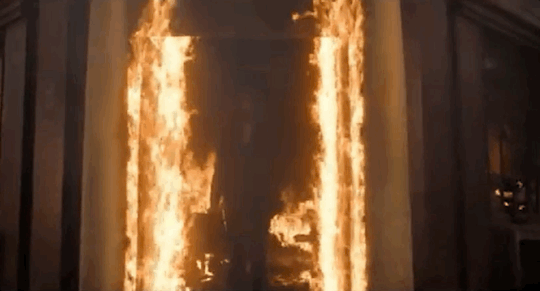
Most likely singed…

Most likely singed…

So that's everything from purely within Good Omens canon.
Baraqiel is described, additionally, in the Book of Enoch as:
Lord of Lightning

Who taught the forbidden knowledge of astronomy:

He is also the overseer of the Second Heaven, wherein lies the prison of Fallen Angels. More on that later.
The story of Baraqiel’s ejection from Heaven is contained in the Book of Enoch, but he’s not a main character. In fact, he’s only one of twenty major fallen angels, specifically, the ninth. The tenth is Azazel.
Who, then, is Azazel?
Firstly, Azazel is a fallen angel:
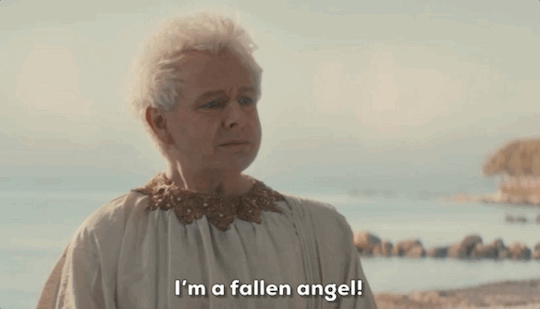
Who is damned because he introduces humans to forbidden knowledge, specifically, the knowledge of swords [and other devices of warfare]:
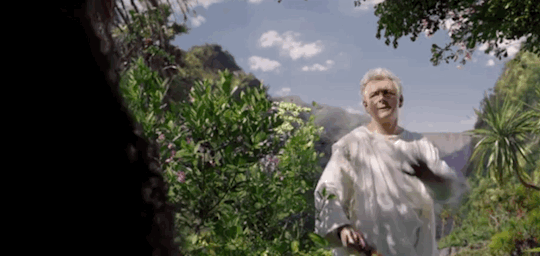
And also the knowledge of adornment, specifically, “the art of making up the eyes, and of beautifying the eyelids, and the most precious stones, and all kinds of coloured dyes.”
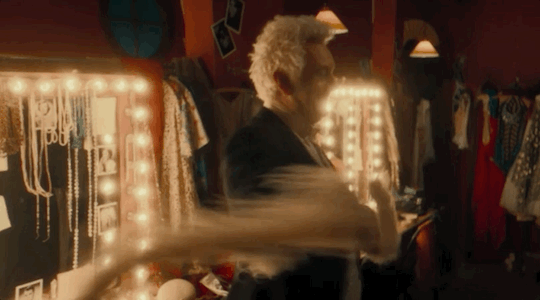
And insofar as Azazel is synonymous with Azzael, he denounces the authority of the Metatron:
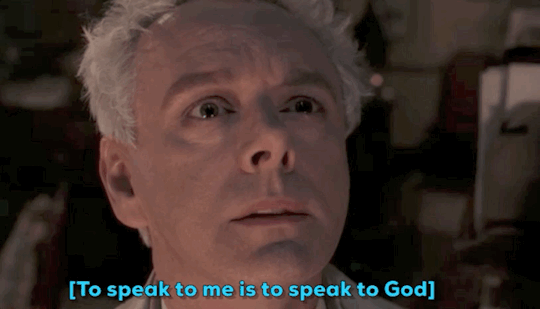
In fact, Azazel is given all the blame for revealing the secrets of Heaven: “the whole Earth has been ruined by the teaching of the works of Azazel; and against him write: ALL SIN.”
and God orders Raphael punish Azazel: “And further the Lord said to Raphael: "Bind Azazel by his hands and his feet and throw him into the darkness. And split open the desert, which is in Dudael, and throw him there.””
We never learn in the Book of Enoch that Raphael actually does this (based on my reading), but it was commanded. In fact, Raphael would have had to throw Azazel into that prison which was in the domain of Baraqiel.
This puts Baraqiel!Crowley and Azazel!Aziraphale among the ranks of angels that went to Earth and delighted in Earthly pleasures, which caused them to be “fallen,” that God refused to speak to from then on, that Enoch!Metatron was ordered by God to tell that they were unforgiven and would never be forgiven.
It’s worth noting that there seems to be some disagreement among rabbinical scholars over whether Samyaza, Azza, Azzael, and Azazel are separate entities or if these are different names for the same entity. We should also remember that in the universe of Good Omens, entities change names when they ascend to or fall from Heaven.
Tying this all back to the Metatron: In 3 Enoch, the book which describes the ascent of Enoch the man to Metatron the angel, we learn that the overseer of the Second Heaven is Baraqiel, angel of lightning. The description of the prison in the Second Heaven and the angels trapped within it is terrifying, but not more than Enoch’s own actions when he is there.
At this point Enoch has not been transfigured into the Metatron yet, but when he passes by, the angels ask him to pray for them to the Lord; and he refuses, for “who am I, a mortal man, that I may pray for angels?” He is told about them again in the Fifth Heaven, about their sins, how they followed Satan, and that they will be punished on Judgment Day.
So we have a lot of reasons here to see that there would be enmity directly between the Metatron and Azazel, for questioning his authority before God, and between Baraqiel and Enoch!Metatron, for either Baraqiel was guarding the prison or already in it when the human who would become Metatron was supplicated for prayers of redemption and refused. Either way, the Metatron is responsible for Baraqiel’s fall, most directly because he refused to take the petition of the fallen angels before God and instead relied on his interpretation of a dream.
There’s been a lot of implication and even exposition throughout S2 that memory is vulnerable to erasure. We’ve gotten some direct hints that Crowley doesn’t remember all of his past, but I would venture to propose that Aziraphale has a very troubled past that he does not remember, that the Metatron (and possibly Crowley) does, and that further, because his memory was [partially] removed, his name was changed to Aziraphale, for which we see precedent in Jimbriel and all the demons.
My absolutely unhinged, unsubstantiated S3 prediction is that Angel!Crowley sacrificed himself to rescue Azazel from damnation, and the price of Azazel remaining an angel was losing the memories of his transgressions, including (and especially) those he formed with Angel!Crowley. That at the Garden of Eden, Crawley!Crowley knew that these things had been erased, and that he was probably talking to a husk of his former friend, the way that Jim was a husk of Gabriel, but that when he learned that Aziraphale had given away the sword, realized that the soul of the person he loved was still in there.
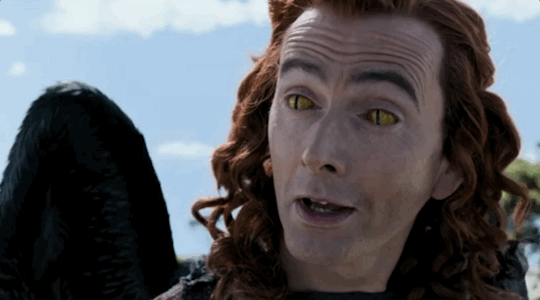
Partner post: For a meta on why we should believe that Enoch!Metatron aka Human!Metatron is a possibility, go here.
Edit: I read the Book of Enoch from front to back, twice, but if you want to check my work (or write a response meta!) you can find the source material here and here.
If you liked this husbands-centric meta, you may like A Nightingale Sang in 1941
If you liked this historic event speculation, you may like Sodom and Gomorrah
#good omens#good omens 2#good omens meta#ineffable husbands#aziraphale#crowley#metatron#good omens theory#baraqiel#azazel#book of enoch#this took a really long time you guys so please leave a note <3#ivoc#erasure theory
751 notes
·
View notes
Text
Good Omens Season 2: Some Thoughts (and also Screaming)
First, /screams
Second, obligatory disclaimer that this meta contains MAJOR SPOILERS for all six episodes. If you somehow have managed to remain virginally unspoiled, look away now, scroll past, or add "good omens s2" and "good omens spoilers" to your block list, as those are the tags I have been using for all posts and reblogs.
Third, /screams more
Okay okay okay. Deep breaths.
Anyway, so, uh, how about all that, huh? First, the good thing about the tone of the season overall was that it felt considerably darker and more adult, in a good way. We didn't have the precocious kiddies, the kitsch and literally-comphet Anathema and Newt, the so-clever narration, etc. All that was gone, which makes sense when you consider that a) the end of last season saw them reboot into an entirely new universe, and b) the fact that God has gone silent is, in fact, a major plot point for the season. We don't have Her slyly telling us the story, or indeed anything, and everyone is left to make their own judgments and take their own actions. Which, obviously, gets them into a lot of trouble, especially when Metatron (the Voice of God, aka someone acting in the belief that they're speaking for God and therefore doing terrible harm) swoops in with the ultimate buzzkill at the end of episode 6. But we'll get to that.
The downside was that the main, present-day plot (hiding Gabriel in the bookshop and trying to get Nina and Maggie to fall in love) was fairly thin, felt stretched out and at times weirdly paced, and otherwise existed mostly to get us to That Ending and the setup for season 3. But the ending was so damn good (if obviously, very painful) that I can't be TOO mad, not least because we spent six episodes with them just making absolutely no pretense about the whole thing being as incredibly homosexual as possible. I'll be honest: I did not think they were going to actually, explicitly go there. Neil Gaiman has been so consistent about "your interpretations are valid and you're welcome to read it however you want, but the only canon is what's on screen," which I think is frankly a good thing (not least since the Neil GAYman Cinematic Universe is consistently very, very good to us queers), that I just... didn't quite think they'd pull the trigger. Sir Terry is dead and can't have active input, this is based on a book published 30 years ago, maybe they didn't want to make it LIKE THAT... etc. I certainly hoped, but I didn't really think they would.
Uh. Well.
As I said in my various semi-coherent liveblog posts, I honestly don't think there was a single straight person in the entire season, among both major and background characters. Aziraphale/Crowley and Maggie/Nina are the obvious paralleling couples, but Beelzebub (using "they" pronouns and addressed as "Lord" despite presenting as femme/femme-adjacent) is clearly nonbinary and therefore also queer, and the countless gay/queer side characters were just /chefs kiss. From Job's son making a sassy pass at Aziraphale, to the random Scottish goon with Grindr on his phone (which he then gives to Aziraphale, because what is subtlety), to the interracial couple with the trans spouse at the Pride and Prejudice ball, there was just a lot of casual, unremarked, non-story-critical queer representation visible at every turn. It's like the NGCU saw the bigots wailing about Sandman season 1 being extremely gay and went CHALLENGE ACCEPTED, LET'S MAKE GOOD OMENS 2 EVEN MORE GAY.
God bless.
Obviously, Jon Hamm as Amnesia!Gabriel stole the show (he was SO fucking funny) and it was also incredibly fun to watch Miranda Richardson repurposed as a scheming demon. Nina Sosanya also reappeared as Nina the coffee shop owner, which leads us into the Maggie-and-Nina subplot. They're obviously, wildly, incredibly clearly an analogue for Aziraphale and Crowley themselves, but they're also each, crucially, a mix of both. On the surface, Maggie is Aziraphale: the plump, blonde, earnest, sweet-natured one owning a slightly dated book music shop and somewhat clueless about emotional nuances, while Nina is (also on the surface) Crowley, the hard-edged dark loner who doesn't want to open herself up to people or be spotted caring. But emotionally, Maggie is Crowley: the one openly pining, clearly besotted, only wanting to hang around their crush and do whatever they can to make themselves useful, while Nina is Aziraphale. Interested but reticent, attracted but conflicted, trapped in an abusive relationship with a demanding offscreen "lover" (Lindsay/Heaven) who tries to constantly control and shame them without ever offering much, if anything in return. By the end, they bring themselves around to what Maggie/Crowley are offering, but by then, well. We've got a lot more problems on our hands.
As I also said in my earlier posts, this entire thing has always been a metaphor for religion, queerness, and what religion -- especially abusive, fundamentalist, organized religion -- does to queer people, but they really cranked the FUCK out of that metaphor this season. Aziraphale is guilt-tripped, controlled, and shamed for his attraction to Crowley at every turn. He is torn between his imagined duty to Heaven, in all its ignorant, uncaring, bureaucratic, gratuitously cruel system that he still insists on seeing the best in because he can't bear the alternative, and the chaotic and sometimes grey but genuinely more good morality that Crowley offers him. (Can I just say, we were explicitly shown that the two of them together doing "just a little miracle" are more powerful than Heaven AND Hell combined.) And at the end, he's told that the only way he can be with Crowley -- what Metatron explicitly blackmails him with -- is if they both go back to heaven, submit themselves to the cruel system again and give up everything that has made them who they are: their home in London, their human friends, their reliance on each other, their independence, their own ways of doing things. You can be queer in this (religious) framework, but only the limited, watered-down, controlled, controllable, constantly-under-supervision kind of queer, which relies on both you and your lover "converting" back to the true faith. And if you don't cooperate, they will literally kidnap you, lie to you, manipulate you, take you from your soulmate, and force you right back into doing the one thing (destroying the world) that you never, ever wanted to do in the first place, because in their minds, that is still better than this. It's for your own good.
Ouch.
And the thing is: that's why the ending a) hits so hard and b) is so fucking painful, because of course Aziraphale agrees. He has no conception of being able to defy Heaven on his own; he has always, always needed Crowley for that. In the flashbacks, when Aziraphale is faced with an order from Heaven that he desperately does not want to carry out (such as letting all Job's children get killed), he still relies completely on Crowley to "outsmart the rules" and find a better way. Crowley is A Crafty Demon; that's what he does, and so Aziraphale rationalizes it to himself that therefore that must be fine. Even in season 1, when he really didn't want the Apocalypse to happen but initially thought it was his duty as a good Heaven footsoldier, he relied on Crowley to talk him out of it and allow him to do what he really wants instead. That's their whole dynamic in a nutshell, as exemplified in that scene in episode 2, where Crowley tempts Aziraphale with the "pleasures of the flesh" while sprawled on his back in Ravish Me mode like the giant walking gay disaster that he is. (Sorry, buddy. That beard. Can't do it.) Everything that Aziraphale's existence is, that makes him who he is, that he loves and cherishes the most (in this case, food and wine) comes from Crowley. Everything else is just background noise.
Throughout the season, what we see is Aziraphale increasingly coming around to the fantasy of being with Crowley. He's coy and flirty; he talks about "our car" and expects Crowley will let him (which he does); he wants to have a Jane Austen ball and for them to dance together (oh my heart); he even thinks, at the crucial moment, that the best way for them to be together is to go back to heaven just like they were in the beginning, once more perfect angels, as if those entire six thousand years of struggle and grief and pining and separation and falling didn't happen. And Crowley -- poor, poor, brave, devoted, heartbroken Crowley -- has just heard for the first time in said six thousand years that actually telling the person you love how you feel is an option. Maggie and Nina tell them point-blank that their whole stupid plan failed because people aren't chess pieces who can be moved and automatically achieve the desired result. And of course this gobsmacks the dearest and dumbest Ineffable Husbands, because they can't conceive of anything else. People are chess pieces in the Great War of Heaven and Hell; Aziraphale and Crowley themselves are chess pieces who have been desperately trying to get out of being moved by external forces, but that doesn't change the fact that that's what they are. They don't have volition or agency aside from that which they can sneak for themselves in brief and stolen moments. That's it.
Until, well. It's not it. They discover that this whole would-be war is actually an elaborate ruse to cover up another angel-demon romance, that of Gabriel and Beelzebub. (I'll be honest, I'm 99% sure they did this storyline because they saw the fans crackshipping them, but I appreciate a fictional narrative that values and incorporates its fans' input, rather than trying to constantly "trick" or "outsmart" them or "do what they don't expect.") And Gabriel and Beelzebub get to be together, but only by leaving their world forever. They have to desert their homes, their structures, even their own identities, and never return. And Crowley and Aziraphale are so rooted in their "precious, perfect, fragile" life in their little corner of Soho, with their bookshop and their Bentley and their dining at the Ritz (which they didn't get to do in the end because METATRON /shakes fist), that that just doesn't work. Neither of them can conceive of doing that. So Aziraphale thinks "go back to heaven and try to make the terrible system do some good and take what we can in terms of being together" and Crowley just... pours out his heart. He's ready to fucking propose. He barely stops himself from saying something to the effect of "I want to spend eternity with you." He begs, he pleads with Aziraphale to go away not in the literal sense, but the emotional/metaphysical: to finally break this toxic dependence on Heaven and tell them once and for all where to stick it. And because he is desperate to make Aziraphale understand, he finally throws all caution to the winds and recklessly, desperately, adoringly kisses him, the one thing he's wanted to do for ages and...
Gets. Shot. Down.
Ugghhhhh. I'm suffering all over again. Aziraphale wants him, hungers for it, for them, and yet he's been so abused and so conditioned by Heaven (he's still blithely repeating to Crowley's face that "Hell are the bad guys!") that he just cannot accept that kind of desperate, blind, limitless, lawless affection. He even forgives Crowley for this "transgression," just to really twist the knife, and Crowley just can't take it, can't face up to how terribly this has all gone up in flames, after he went to heaven trying to find the answer for Gabriel's situation. Gabriel, who he fucking hates. Gabriel, who tried to kill the angelic being he loves (and for which Crowley has transparently never forgiven him). And yet at one pouty puppy-eyed look from Aziraphale and a warning that whoever is harboring Gabriel might be in danger, Crowley leaps headlong into the Bentley again and rushes to the rescue while "Good Old Fashioned Lover Boy" is blaring. He stoutly protects Gabriel; he does a miracle to disguise him; he lets him have hot chocolate and stay in the bookshop; he guards him from the literal demonic horde outside. All because of Aziraphale. That's it. And then, it still doesn't work. Not only that, Gabriel's absence and decision to forego Armageddon gives Heaven the one tool they finally need to take Aziraphale away from him.
I repeat: Ugghhhhhhhh.
(In a good way. Ngl, I love this angst. This is the kind of angst my brain Thrives on, the Thematic Parallel Romantic Character Arc kind. Nom nom nom. But also: AGONY.)
I also need to talk about Aziraphale driving the Bentley, aside from the obvious metaphor of him being in Crowley's home while Crowley is in his. Last season, we had the "you go too fast for me, Crowley" scene with them sitting in said Bentley, which was Aziraphale saying he's not ready for a relationship. In this season, as noted above, we see Aziraphale increasingly embracing the potential fantasy of being with Crowley. But here's the catch: when he's in the Bentley this time, driving it, setting the pace, acclimating to the idea, he's driving his own idea of what the Bentley/his relationship with Crowley is. It's not the real thing. He plays classical music; he supplies himself sweets; he turns it yellow; he drives too slow. Crowley calls him in another old-married-couple snitfit to complain that Aziraphale's messed it up, but what Aziraphale has actually messed up (or will, by the end of the season) is far more consequential than just a car. He's changed the entire shape of their relationship to the one he thinks can make it work, and it just doesn't. It has to be them -- "we could have been... Us" -- or it's not even close to the truth. It's not worth their time.
I repeat: Ouch.
Speaking of the writers validating fan theories, I know we all picked up and screamed about on Crowley's idea of Peak Romance Guaranteed To Fall In Love being sheltering from rain and gazing into each other's eyes, which confirms that that poor bastard was indeed ass-over-teakettle gone as soon as he met Aziraphale (again) in Eden. I also need to talk about the 1941 redux, because wow. This time, the danger comes from Hell, which we see being its usual self: gleefully, pointlessly cruel, pettily backbiting, dirty, sniping, tedious, endless, determined to mindlessly destroy because They're The Bad Guys and they like it. So they blackmail, spy on, miracle-block, illicitly photograph, and try to prove that Aziraphale and Crowley are secretly a couple, right after Aziraphale himself has just had the Light From Heaven realization that he's in love (which we all also picked up on in s1). They're forcibly outing them (to speak of more Religious Queer Trauma) in order to break them up/get them into trouble with their authorities/families. Aziraphale and Crowley manage to escape it mostly by dumb luck, but Crowley having an altogether freakout, hands shaking, barely able to actually point the gun at Aziraphale even in the knowledge that it's supposed to be fake, is just... wow. He can't even fathom the idea of ever trying to destroy him in earnest, especially when he knows on some level that Aziraphale also finally just realized his own feelings. So I just need to --
/screams
Anyway, Aziraphale's entire arc this season is doing what he thinks is the right thing and then inadvertently causing harm and damage as a result. In the Edinburgh flashbacks (live slug reaction of me: SEAN BIGGERSTAFF???!!) he tries to stop Elspeth from stealing bodies and gets Morag killed and Crowley drinking the laudanum to save him (though that part with David Tennant just riffing left and right, using his natural Scottish accent, and being Tiny Crowley/Huge Crowley was hilarious). He invites his neighbors to a Pride and Prejudice ball and makes them all the target for demonic attack. And of course the Job episode: Aziraphale, horrified at Heaven's callous cruelty, desperate not to get Job's children killed, willing to go along with Crowley's tricks to save them somehow, tempted by Crowley to do the fucknasty with their angel bits eat some food and decide that he likes it. As mentioned, the whole thing about God being silent this season is a major thematic choice. The only time we see/hear God is Her communing with Job from afar. Aziraphale enviously imagines the answers he must be getting (he's not, he's baffled and perplexed), while Crowley longs beyond words to even have the opportunity to ask the question: why? Why do this? Why is this your plan?
And of course, this absence culminates in the Metatron, the Voice of God, the person arrogantly claiming that they're speaking for God and know exactly what Heaven wants, being able to seize Aziraphale by the short hairs and absolutely fuck him over. Gabriel is gone/decommissioned/eloping with Beelzebub, so Heaven needs a Supreme Leader (God apparently is no longer a factor in the equation). And what this Supreme Leader needs to do is finally unleash the Apocalypse that Gabriel decided to pass on (the Second Coming). Aziraphale needs to be punished, taken away from Crowley's influence/love, and put back under Heaven's explicit control, so Metatron spots a great opportunity to do all three at once. It's not an accident that the exact tool he uses to get Aziraphale to agree is "now you can actually be with Crowley!" Aziraphale and Crowley have been trying so hard to hide out from their respective Head Offices, but now all at once, there's this seemingly miraculous opportunity for them not to have to do that anymore! They can be together! They can be sanctioned by Heaven! They can give up all this hiding and sneaking around and lying! Isn't that better?
... As long as, of course, they give up absolutely everything that makes them who they are. No big deal. Minor catch. Probably nothing.
Metatron doesn't let Aziraphale have time to escape, or think it over, or reflect, or anything. He pressures Aziraphale to come with him immediately, or be once more subject to Heaven's implicit wrath/destruction/judgment. Believe me, Aziraphale already KNOWS he's made a huge mistake, as soon as he hears what Metatron really wants: bringing him back to unleash the Apocalypse that Aziraphale and Crowley have given up literally everything to prevent. He doesn't need time to reflect. By the time my man is in that elevator, he's well aware of what a catastrophic misjudgment he's made, and yet --
Aziraphale needs this. He has, as noted, literally always relied on Crowley outsmarting Heaven's cruel orders in order to prevent himself from having to do them. He's relied on Crowley rescuing him ("rescuing me makes him so happy," WELL BUB, IT'S BECAUSE YOU ALWAYS NEED IT). He admits to Crowley's face that "I need you!" He hates Heaven's sadistic meanness, but he has absolutely no framework, in and of himself, to defy it. When the rubber hits the road, he will crumple and try to go along with it, and now he's been put in a position where he's going to have to stand up, defy Heaven, and make the break once and for all BY HIMSELF. He doesn't have Crowley around to do it for him, he has no support, he is going to arrive in Heaven and be shuttled straight off to the Apocalypse 2.0 War Room. The only way he gets out of this is if he actively stands up, if he chooses himself and Crowley and their life, and he has to.
The thing is:
Aziraphale has lived his entire eternal existence Looking Up. Up is the direction of Goodness and Heaven. Up is where Angels go. Up is where Aziraphale comes from and where Demons and Hell are not. But now he's going Up, in a position to take over the whole shebang, and it's the last thing he wants.
So he's going to have to come back Down.
He's going to have to Fall. He's going to have to get back Below at all costs. He's going to have to finally, once and for all, understand what led Crowley to make the choice to leave Heaven and never come back. It's only then that they can possibly be together on any kind of conscious, equal, deliberate footing, claim their own agency, reject Heaven AND Hell, and try to really earn that South Downs cottage and that happy-ever-after, and it's gonna hurt so good.
Now if you will excuse me, /screams
#good omens#good omens meta#good omens s2#good omens spoilers#ineffable husbands#look this probably could have been twice as long#but i had to stop somewhere#I JUST HAVE A LOT OF FEELINGS
904 notes
·
View notes
Text
Oh my god I woke up this morning and my Stardew Valley meta post had almost 150 notes????? Hello?????????? Anyways I started writing this last night because @moon-is-pretty-tonight left nice tags on the original so thank you so much!!
We know from the starting scenes of the game that the farmer's grandfather loved Stardew Valley. So why did he leave? Pelican Town is a good place to grow old; George and Evelyn are just fine. It's a fine place to raise a kid, but maybe he just wanted to raise his child closer to real schools and other children.
Or maybe, just maybe, he understood.
Was there a day when he was in his thirties where he looked at his friends and realized they weren't like him? That he could run faster than them, work longer, explore deeper into the hidden places of the valley?
Was there a day when he went to the wizard to ask him for help, for knowledge if nothing else? Did he learn then that his family was different? Special? Chosen? And how did he react? He couldn't possibly raise a child in the valley if they would be as strange and fey as him. He had to leave. There was no other way.
But years later, on his deathbed, did he regret that choice?
Is that why he gave the farmer the letter?
Is that why they went back home?
When the farmer steps off the bus that first day, the valley is still on the cusp of winter, just barely tipping over into spring. The flowers are starting to bloom, but a chill still hangs in the air. As soon as the farmer's boots touch the soil there's a change. The air gets warmer. The trees get greener. Not by too much, not all at once, but it changes.
The junimos watch the farmer as they do their work. They're new to farming, but take to it with frightening speed; their first batch of crops is perfect. None of the townsfolk tell them that parsnips don't normally grow in less than a week, that cauliflowers don't grow to be ten feet tall, that fairies don't visit when the sun goes down and grow potatoes and beans and tulips overnight. The junimos talk amongst themselves in their strange, wild language, and agree: this is the one. They're back. The valley recognizes its own, even when they've left for a generation. The farmers have come home.
Things change fast in the valley. The community center, empty and decrepit for so many years, is rejuvenated. (Lewis says it was abandoned only a few weeks after the farmer's grandfather left. Strange coincidence, he says, that it both came and went with the farmer's family.) The mines and the quarry, similarly abandoned, are explored for the first time in ages. The town becomes cleaner, brighter, more vibrant, happier.
And it is happier. Not just the environment, but the people. It's the talk of the town for weeks when Haley does her first closet purge. Leah's art show in the town square is a huge success. Shane's smiling for the first time since he moved to the valley. All of them, when asked, say it's all thanks to the farmer.
People love to ask why Lewis didn't fix the community center on his own. Why Willy never repaired the boat to ginger island. Why Abigail or Marlon never went down to fix the elevator in the mines, or why Clint didn't fix the minecarts.
But isn't it so much more interesting to ask how those things were there in the first place? How they got so broken down? If the stories the townspeople tell are true, the valley was once a beautiful place, flourishing and full of life; why did that change? When did it change?
Was it when the farmer's grandfather, the locus of the valley, its chosen representative, left town?
And if so, what happens when the farmer comes back?
#lich says shit#stardew valley#stardew farmer#sdv#my writing#Hope y'all enjoyed!#I'm thinking about developing this into. Like. An actual Fan Fiction. Still sort of short-form but like with more detail?#LMK if you'd be interested to see that! Also if you want to be tagged in future installations of this please just let me know :)#I'm super into this version of the farmer as like. Blessed and cryptic child of the valley with all the strange behavior that entails#If i DO write a more in-depth version of this it'll be from the perspective of someone in town#maybe Leah? She seems like she'd be the one to notice the farmer being Odd. Either that or I'll do it from the perspective of multiple--#--different people to get their unique insights and stuff#I'd also want to dig into like#The family history of the farmer. And what that's like.#Because like why did grandpa leave?#He clearly loved the valley#So why didn't he stay?#Why did he give the deed to his grandchild and not his literal child?#And is it a coincidence that everything in the valley went downhill when he left?#I don't think so.
161 notes
·
View notes
Note
Pleeease, write your thoughts about the musical lol. I really like your Dio meta posts <3
Just a disclaimer: this is really opinionated but I don't like to drag media for its own sake. There were lots of things to like in the Phantom Blood musical, just ... Dio wasn't one of them. Also, Mamoru Miyano threw himself into the performance he was asked for, so it's hardly his fault. It's just always amazing to me that people feel the need to rewrite Dio into someone else when the way Araki's written him is already perfect, complete and a lot of fun.
So, where to start? Basically, the Phantom Blood musical re-writes Dio, giving him a different personality and different motivations through OOC stage direction along with a bunch of original dialog and scenes. What results is a version of Phantom Blood where "Dio" is just a normal guy without charisma who had a bad childhood and spends most of the story being miserable. Dio as he's written in canon has an uncommon charisma and appeal that's allowed him to remain relevant as one of those 'all-time great' villains. Scene after scene in the musical prove that its creative team either didn't read the manga or just really didn't like Dio.
fwiw Araki wrote Dio as thoroughly fleshed-out, with consistent traits and behaviors and consistent motivations behind his actions. He also left a paper trail of interviews and author's commentaries that develop Dio even more fully beyond the manga. So there's really no excuse for media that treat Dio as some sort of empty vessel waiting to be filled by narrative cliches we already know and expect.
It's annoying too, because, along with its OOC content, the musical is peppered with occasional manga-consistent moments. It's like the musical is camouflaging its Very Bad Take on Dio by having Mamoru Miyano periodically re-enact the canon character's most famous panels. The musical wants simultaneously to take credit for bringing Araki's vision to life on the stage, while at the same time completely undermining its most important element: a capital V "Villain" who, according to Araki, "accepts and embraces his evil nature, and follows his dark path without hesitation." This is the biggest change the musical makes to Dio: musical!Dio has none of the confidence that allows canon Dio him to move so decisively and destructively through the narrative.
Musical Dio is introduced by a scene where he's bullied on his way home, before breaking into a song about how terrible his life is, where "everything is always taken from [him]" ("it's hell …I feel nauseated …[I'm] under a cloudy sky.") The song is alternately tearful and hopeful. "I'm going crazy from being robbed!" he laments and then pollyannaishly muses, "hey, Joestar, can you turn my [cloudy] skies to blue?"
If Dio being introduced as a sad sap and self-described perennial loser hoping for any break sounds attitudinally unfamiliar that's because it is. Araki went in the opposite direction: he started his story by subverting the cliche - wide-eyed poor boy victimized by circumstance leaves his sorrow-filled life hoping for a new start - and instead gave us a kid with surprising, even sinister agency. Dio is not just given a hero's upward narrative arc (something Araki crafted very deliberately), he's introduced improbably in his first scene from a position of control. This fact is important because in the manga it's a position he won't lose until four chapters and nearly 100 pages in, when Jonathan finally fights back. From the time young Dio is introduced - reading a book with his back turned to his bed-ridden father who he's secretly poisoning -
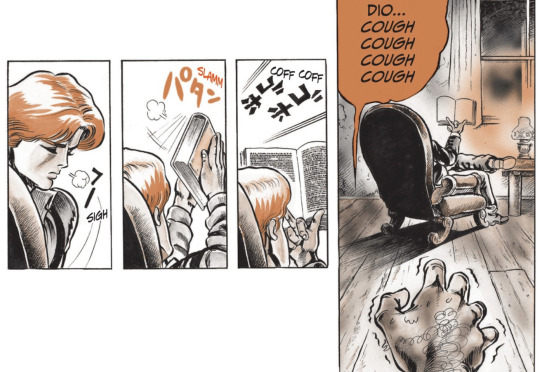
- to the time he's systematically broken down his adoptive brother's spirit by alienating him from his friends, taking Erina's first kiss, and of course kicking his dog, Dio is shown as being in control and on top (Erina drinking the muddy water is the only exception). It's OOC to imagine 12-year old Dio feeling sorry for himself because at the time he's introduced, he's already made a habit of getting what he wants. By the time he sets off for the Joestars after killing his first dad, he's already developed full confidence in his abilities and the inevitability of his rise to riches (something Araki has him explicitly state and then underscores with a panel illustration of a steam train signaling the rise of Modernity).

But the writers and director of the musical don't find this characterization interesting enough or something. So they lose the canon entirely and in its place they invent a version of Dio who's despondent. And they didn't get Araki's steam train memo so they miss the Modernity theme (even though Araki's tied Dio so tightly conceptually to the idea of the Modern that he has him "use a 20th century boxing technique in the 19th century"); instead they double down on class difference being determinative. It never occurs to them that Dio is written specifically by Araki with the freedom to move outside of his social status because he sees it as artificial (the "evil elite" monologue later reveals Dio thinks of the whole social contract thing is arbitrary and voluntary).
Throughout the musical, Dio (although it's not fair to Mamoru Miyano since he isn't responsible for writing this mess, let's use mamoDio from now on because it's easier) seems to idolize the Joestars for what he calls their "beautiful blood." Not "beautiful" because usable calories for the vampire he will become but "beautiful" because noble. The Joestars' noble status and the honor that's apparently behind that status become the shining "star" toward which mud-bound mamoDio flailingly, failingly reaches. I don't need to tell you that in canon Dio doesn't have respect for nobility.
"Mud and stars" is heavy-handedly introduced as a dominant theme of the musical. According to the play, Jonathan, noble and bright, looks to the stars while human Dio, pathetic, conflicted and even confused, can only see life as a mud-soaked prison.
Now, the mud and stars thing was only used in Part 1 as a single text element on a Volume 1 illustration but, in spite of its marginality, it's becomes a liturgical text for some fans looking for an explanation for Dio's actions beyond what Araki gives them in the actual narrative. To this sort of fan, a guy who embraces his inner talent for evil and never had the misfortune of developing a moral compass isn't the right type of villain because he's unapologetic. If the villain doesn't have excuses how can you apologize for him? So they need Dio and by extension Araki to give them a "good enough" reason to accept Dio's ever-escalating atrocities. If the reasons Dio has for doing the things he does lie outside of what's considered good or acceptable, they are simply rejected and new reasons are invented in the hope of making Dio much less objectionable.
Now, like I said earlier, Araki's repeatedly told us in his writings that Dio has an upward narrative trajectory, not a downward, "mud"-bound one. The mud and stars duality fails to describe the narrative journey of the two main characters: both look upward to transcend their circumstances and travel along a shonen manga hero's rising path. (In fact, it's Jonathan who needs a good push to realize his potential, something Dio happily provides). And it's Jonathan, not Dio, who Araki first gives a downward arc, being handed defeat after defeat for those first four chapters before gaining his footing and progressively rising to Dio's challenges. "Mud and stars" isn't just a bad choice of metaphor, it's a misleading one.
Back to the musical, mamoDio is the exact opposite. An air of sadness and insecurity haunts his performance. An original scene where George presents the mud and stars dilemma as a lesson highlights Dio's lack of confidence and the depression that lurks behind it, as Dio bemoans how people doomed to "struggle and die" cannot possibly summon the hope it takes to look up to the stars (he's talking of course about himself).
Likewise, and here's where mamoDio's failure as a character really comes into full relief, seven years after this, when Dio's machinations are revealed and he's about to be arrested, before he uses the stone mask, mamoDio drops to the floor and spends the better part of a musical number in tears, bemoaning his sorry life ("I'm trapped in a prison covered in mud… no matter how hard I struggle I'm crushed…") and his lack of noble blood.

(btw this is after the manga scene where Dio fake cries; here, mamoDio is genuinely distraught).
Contrast this to the actual scene in the manga. His expressions in these panels are memorable because of how assured Araki draws him. Dio's entire world - his poisoning scheme, his grab at what one can assume would have been the entirety of the Joestar estate - is about to end but instead of despairing, he launches into a philosophical soliloquy. His body language is haughty: this isn't mamoDio crawling on the ground and decrying his upbringing and lack of noble blood, instead this is a man who apparently, almost irrationally, perceives himself as noble. When he uses the mask, Dio is smiling widely. Metaphorically speaking, he's looking at the stars.
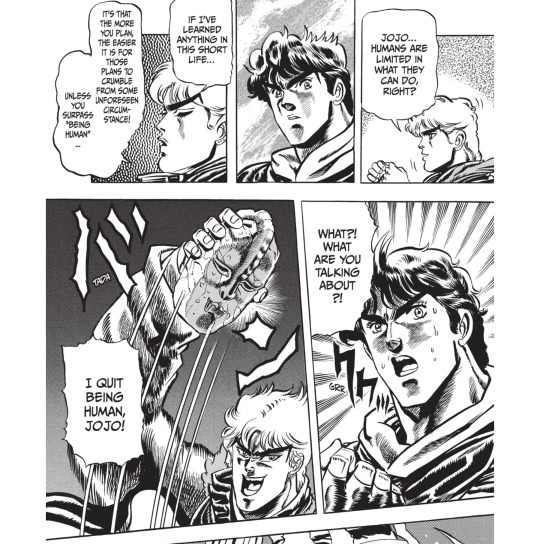
When mamoDio uses the mask? He's on his knees. He's in tears. On one night he interjects, "Mother…" In short, he's conflicted.
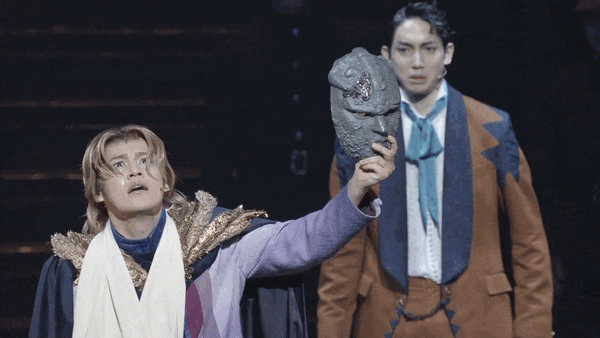
One of these depicts Dio. The other does not.
Now obviously the writers and director of the musical must think making these seismic changes adds something to Dio's character. But (and I feel like this is a theme whenever I write these things) I'd argue it only makes him more basic. It makes him predictable and formulaic, someone we've seen in countless other stories.
(Oh! and did I mention mamoDio repeatedly calls himself "useless"!! Because he does this.)
Now, because mamoDio has no confidence and as a human acts out of desperation, when he becomes a vampire he still isn't Dio. Mamoru tries to make his vampire Dio evil and scary by expending a lot of energy, running about the stage and sticking out his tongue ad nauseum. When you look at how Araki has Dio move physically throughout the manga, it's the opposite of kinetic. Dio is a point of fixity who's charisma draws others toward him (ask me for more on this if you want because there's enough here for its own post).
Now for the worst of the worst: at the very end of the production, after the manga ending that features Jonathan's death and Dio's (presumed) defeat as a head imprisoned in Jonathan's arms, the musical takes an original twist in which, following a finale number featuring most of the cast, mamoDio is lead offstage by Jonathan. You read that right. mamoDio is hunched over, resigned, and Jonathan seems to take on a paternal role. Although the lyrics would have you believe this has something to do with "two fates becoming one," it's clear from the stage direction that any embers of Dio's ambition are being tamed and extinguished as Jonathan takes Dio's grasping hand, subdues him, and leads him docilely into the darkness.
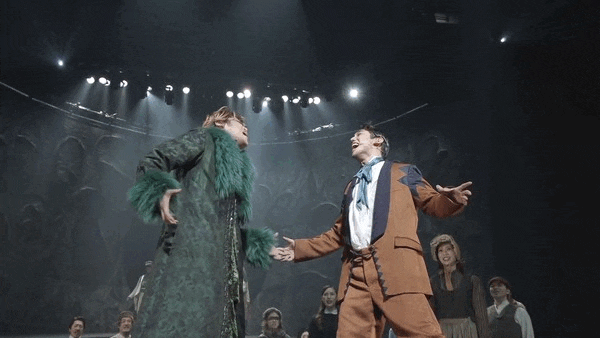
It turns out Dio's vampire arc was just a phase, a hurt and lonely child lashing out and making a mess for attention.
His body language here is obscenely out of character. Consider the following because, as I said in the opening, in spite of what all these re-writes of Dio would have you believe, Araki crafted Dio with specificity and consistency: Araki only draws Dio (with very few exceptions) 1) standing tall, looking down at you; 2) back turned, looking back and down at you; or simply 3) back turned, (performatively?) ignoring you. Dio is never on the ground except when he's knocked down (think, young Jonathan finally fighting back in the Joestar home or, much later, Jotaro stopping time and landing those punches). By constrast, mamoDio has spent an incessant amount of time of the ground, crouching, kneeling,, bowing, hunched down. Who is this guy? So his hunched-down exit in the final moments of the production, literally being led by Jonathan (controlled??), is so amazingly stupid that if I didn't have a gif as proof, you might think I'm just making this stuff up:
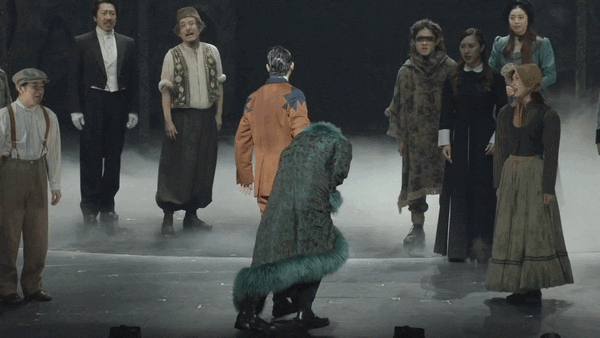
There's plenty more to unpack that I won't address here: ghost Dario. The lack of grave-spitting. The complete absence of true joy or leisure expressed by Dio especially during his vampire era: no woman eating her baby, no owlcats, no Poco's sister. No chaise lounge. No roses(!). No fun. Not for Dio. That would be too manga-consistent. That might mean Araki wasn't giving us the appropriate message that bad guys are actually just sad guys.
tl;dr Dio isn't in the Phantom Blood musical. He's replaced by a normal guy who's motivated by a lack of self-esteem and despair that he wasn't born into an upper-class household, or something. He's boring. The result? There can be no Part 3 in this musical's world (and presumably no Parts 4, 5 or 6, no Giorno, no Jolyne, … you get the picture) because mamoDio just gives up. It's a nicely produced little tale about Jonathan Joestar and some random other guy who at some point gets a funny green coat.
#Anonymous#replies tag#jjba#jojo's bizarre adventure#dio brando#mp#dioposts#jojo no kimyou na bouken#jojo#phantom blood#phantom blood musical#dio talk#long post#the fact that media that's otherwise faithful to the text goes out of its way to rewrite Dio and only Dio consistently sends me
130 notes
·
View notes
Note
I just saw this take in a collection of Star Wars videos I was watching and just…… what even:
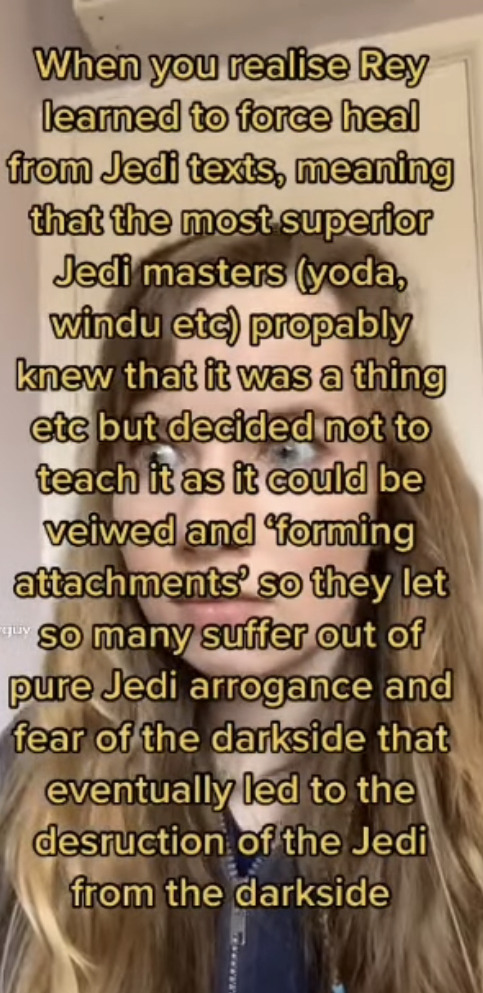
where do people come up with stuff like this. Also I needn’t say it but this makes me so angry
This is what happens when fans try too hard to make something "make sense" in universe rather than accepting a meta/out-of-universe explanation for it.
So sure, if the ST introduces the idea that you can "Force heal" by learning it from some sort of Jedi text, it begs the question of why we never see any of the Prequels Jedi using it. Did they know about it and simply chose not to use it? Was it restricted to Jedi HEALERS for some reason? Did they NOT know about it because it was in a really obscure text that nobody even remembered anymore? And the ST chose not to answer any of those questions, which leaves the fans to try to come up with their own answers.
And the real answer is that the people who made the ST had no fucking idea what they were doing and quite honestly don't seem to have cared much about narrative continuity much at all. There's Force healing in the ST and not in any of the others because Force healing like what we see in the ST would kind-of ruin the entire POINT of the other stories. Luke could just... save Anakin. Anakin could just save Padme. Obi-Wan could just save Qui-Gon. Then where would the story be? Force healing is unsatisfying within the narratives we've been given and ruins the entire point of the message Lucas was sending with them.
But nobody who was making the Sequels fucking cared, so. Now we have Force healing from some random Jedi texts. Cool. Whatever. People who hate the Jedi are just going to hate the Jedi, they'll find whatever reason they want to do so, regardless of what the actual films show and regardless of what Lucas says. As someone who DOES like the Jedi, my explanation for why there's suddenly Force healing that can be learned from a text is that the people making the ST were fucking stupid and nobody realized or cared that it broke a lot of the narratives from the prior two trilogies and went against the themes of those films. That's it.
177 notes
·
View notes
Text
i think in both regards to story, and in terms of meta/real life
doomsday and the destruction of l’manberg killed the server.
whether people were for or against or apart of l’manberg or not, it was a gathering point that brought people together to talk. it was a place people would hang out. it was a place with lots of chests to steal food and supplies from. in new l’manberg so so many people spent their time their even if they were completely unaffiliated or lived somewhere else.
storywise when it was destroyed, the story just lost a central characteristic for conflict, and a very important thing. l’manberg wasn’t just a place. it was ideals it was imagery, it was a goal, it was safety it was so many things, and with it gone with no hopes of returning, no matter how many new places people built they were all empty and never the same.
and with it gone everyone literally had to go their own ways. everyone who gathered there went far far away to make their own homes.
on a meta standpoint, people like talk about how much they miss old dream smp streams and that’s because of the non serious lore streams. where walking down a path and bumping into someone could lead to goofing off or serious talks.
where tommy could build a pathway from manberg to pogtopia for prime and for the upcoming rebellion, and get caught by a vice president who decided it was his day off and he was going to roleplay as a mcdonald’s worker.
it’s how you have tommy and tubbo goofing off on the server not doing lore, only for schlatt to see and they go lore mode and have to make up a pregnancy excuse.
it’s how you got silly serious moments. it’s also just straight up how you had people interact. if everyone lived hundreds of blocks away, it’s harder to just randomly run into each other while building or running to do something, meaning you’re less likely to talk, and less likely for anything to happen.
when l’manberg acted as a central hang out spot, people built their homes in close proximity, they would stick around the area and things naturally happened.
destroying l’manberg was, in my opinion, the worst thing they could have done. doomsday did very very little narratively to the story. the community house gathering did more to the story than doomsday did. and it was awful because tommy rallied people behind him to fight in doomsday not for him, but because if they could do this to l’manberg what would stop them from doing it to every other group.
and everyone fought, and despite an entire server fighting it was pointless.
the only thing doomsday did was force people to hide. and you can make claims for ranboo who went to live with phil and techno- but ranboo’s character arcs could’ve had a very similar outcome by staying with almost anyone else.
no l’manberg ultimately just drove everyone away, and there was never any serious or successful move to make anything on that server take its place, to fill the hole, so there was nothing to actively pull things together. no driving force or motivation, nothing to supply passive roleplay, nothing to bring people together.
everyone lost on doomsday. that loss of l’manberg meant no one could ever win again. just think about it. after doomsday, it was loss after loss.
the final disc confrontation? tommy and tubbo lost. they were rescued, but they lost their fight, and it was a trap anyway.
dream in prison? well he has punz on the outside, doesn’t matter, and he can control ranboo, and he still got to kill tommy AND ghostbur. it was a loss. and he escaped.
every single fight after. quackity lost, wilbur lost, tommy and tubbo lost again, and again. the server for everyone ended in a loss.
there was not ever a win again. usually in stories, after losses, you want something good to happen to make those hardships worth it. just like when good things happen you want bad things to happen to make it worth it, you need a balance.
think of the revolution. the up and down rollercoaster. the freedom into war into loss and death into hope into loss into compromise into win.
the election was a nail biting race where depending on who you voted for, was lose and a win. for tommy and wilbur it was a loss, but they quickly gathered things up, they had hope, and they had energy, and a plan, and techno joined and they were confident. there were ups and downs up until doomsday, afterword no character seemed to get an up. any positive was immediately trivialized. for example tommy’s decided to try and heal and make a hotel which was immediately turned into a problem where people tried to fight him over it and then he died. or he got a pet that made him happen and everyone tried to set it free or kill it. he finally starts to feel safe no relax and dream breaks loose, and he is endlessly stalked the entire time, and he dies alone with his abuser and his abuser’s accomplice.
there is never an up after doomsday, and killing l’manberg that day killed the dream smp.
578 notes
·
View notes
Text
Hunter's Experiences After Belos's Death
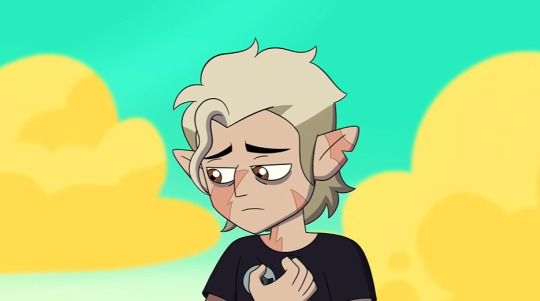
Oops, this got long. Aw well, it was really fun to write.
Special thanks to @ashanimus!
This is speculative at the end of the day, but since:
1. This is my fave animated show of all time
2. I grew up with Complex PTSD (CPTSD) like Hunter
3. I work as a therapist,
I thought to list down some things I can visualize happening in the duration of the finale's timeskip, before that beautiful epilogue we saw. And I want to dive in using whatever clues, leads and parallels I can find in canon: to analyze and see how he went from the Bad But Sad Boy to that peaceful-looking palisman carver in the epilogue.
A small reference I had for this meta is Cinema Therapy's episode on the Hunger Games movies (link), since the protagonist, Katniss Everdeen, from the book and also movie trilogy would have the same diagnosis as Hunter. Those books and movies explored how Katniss coped with the frightening and dramatically different landscape that was the calmness of her world post-victory.
Part 1: His Possible Experiences Leading Up to Seeking a Therapist
His disposition could possibly become like Luz's from early Season 3: a state of emotionally shutting down and numbing out. He appeared to nearly head in this direction right after he was revived by Flapjack, as he began to cry. There was that small window where he could have expressed more tears than he did, and have his body shut down under the weight of bereavement.
But the immediate physical threat, Belos, was still on the run. He got up, sprang into action and didn't catch a break from the time he followed Belos through the portal until he stood in The Collector's palace after Belos died (had he even received the news of his 'Uncle' dying yet??!).
Now that Belos isn't around anymore, the Isles will have a completely different feel and rebuilding the land would've taken grueling work after the dismantling of a damaging Coven System.
I was looking at Luz's behavior and gestures in Thanks to Them, which were indicative of her sinking into depression after 1. the horrible revelation in Hollow Mind that she unintentionally helped Philip. 2. witnessing Flapjack's death. I'm putting screenshots of her below in parallel with Hunter's own emotions in For the Future:
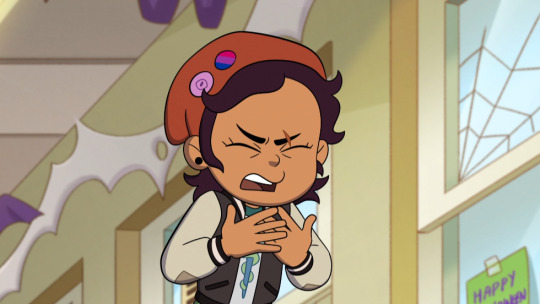

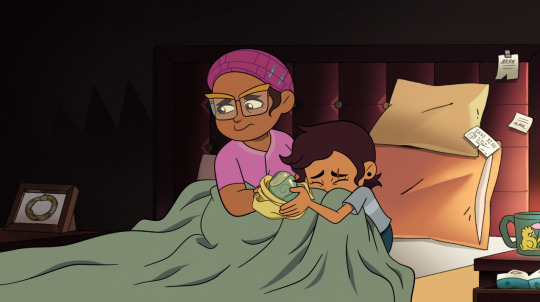

They have different mental health conditions if you talk symptoms, e.g. Luz doesn't show signs of CPTSD hypervigilance, while Hunter doesn't have that slowing down in his physical and mental activity which points to depression. But both have suffered from moral injury thanks to Belos's violence and manipulation.
However, a major comparison is that Hunter has had much more repressed emotion over a long period compared to Luz. The column with Hunter screencaps above, is what he may feel with a much higher intensity in the weeks and months after he first hears that his abuser has passed on.
Shown below, the few seconds of Hunter's big smile drooping when it was all over, was a big hint for me:
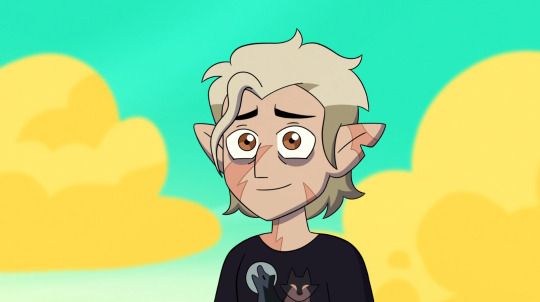
A hint that there is a deep undercurrent of emotions he'd much rather not feel, that he'd probably rather hide from himself. Even while smiling, we know how his heart-wrenching story has played out and the light in his eyes here doesn't match the brightness we see in his expressions in the epilogue, post-timeskip.
That is the face of a kid who has not cried out massive amounts of tears yet. He doesn't look like he's carrying a light load yet, compared to what we see in his future self. And it's certainly a heavier smile than the jollier one he makes here right after King's Tide when Flapjack was still around:
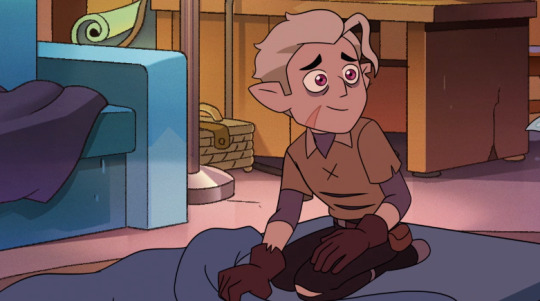
I can't imagine the amount of grief that his body has yet to dredge up and release, once he finally doesn't have to worry about his 'uncle' threatening his life anymore. Too many times to count, I've been in the situation where I cry intensely after being retraumatized and think "Huh? More tears? Where did it come from?? I thought I had cried it all out from my whole being the last time!". It kind of convinced me that anyone with CPTSD has so much grief stored up in their body that the number of times needed to have a good cry feels like a really endless expanse.
However: because I had 7 years of being in and out of therapy, what matters is that the durations between these episodes of mine, the durations of the episodes themselves, plus their intensity have reduced a lot. It was around a 4-year timeskip in the finale, so for Hunter to get as far as he did to heal, his own therapy sessions would've probably been rigorous and very consistent.
Anyway, he might now cycle through his own version of what Luz cycled through when she gradually shuts down from failing to build a new portal door in Thanks to Them, continually believes she's as bad as Belos, and when she alludes to her suicidal ideation in the classroom:
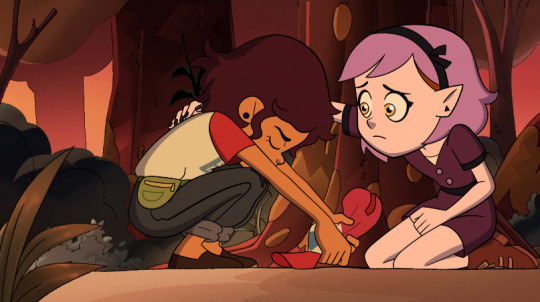
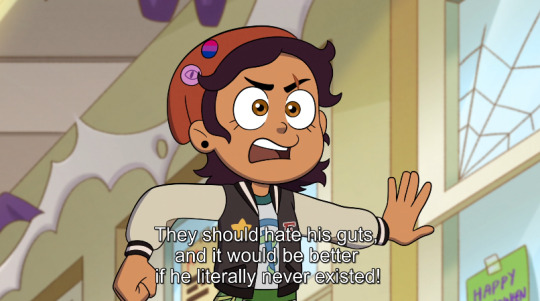
whereby there is a likely parallel between Luz wrestling with guilt from her own moral injury, and Hunter's own guilt from what he wished he could've done to prevent being possessed, to prevent Flapjack from dying. Both their situations are that of moral injuries.
The adrenaline rush would be over for everyone on the Isles.
I'm quite sure the therapists on the Isles will operate pretty soon after the news about Belos's death was out. They would conduct whatever version of mental health triage they have, that involves risk assessments and crisis counselling. Both of these based on what I've learnt are shorter in duration (30 minutes) and are one-off sessions, compared to regular talk therapy which is an hour minimum.
The therapists would be redirecting people to necessary resources e.g. where to find food or loved ones, and managing distress only related to people's immediate needs instead of forming a longer term plan for several weekly sessions.
I believe things are simpler when you are running away from an external threat, like the two Hunter scenarios below. In Hollow Mind there is no emotion on his face because in peak C-PTSD mode he has shut down his emotions to pour that energy into escaping Belos. In Thanks to Them, he appears quite obviously scared with widened eyes because he got comfortable with safety for months and Belos's return was a surprise attack (thanks ashanimus for pointing out to me how his expressions are animated!):
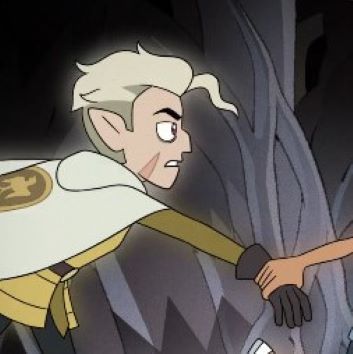

But what is there to run from now? Not an external threat for sure. The war zone is now the one in his mind, heart and soul and it would become front and center. I believe both these screenshots are two notches on a dial, and the missing third image - which would show him finding it difficult to stuff down the grief any longer, might look like a more exasperated version of when he told Willow "Please don't call yourself [a Half-a-Witch] ever again" in For the Future, and eventually a more depressed version of his vanishing smile in The Collector's Palace.
When can he really run from himself? Only while asleep, if he's spared nightmares on any given night, or while distracting himself with the main mission of rebuilding the Isles or continuing to bond with his friends and other people.
His anger in For the Future was a telling sign for me that he made sure his focus was still on an external threat: he still had the opportunity to do so back then, because Belos was still alive. But when we see him in The Collector's palace sending Willow off to her dads, there has realistically been a shift in what will threaten the more fragile shreds of inner peace he's still clinging on to. There are those scary trauma-related emotions to worry about, which wouldn't have just evaporated into thin air. They would be looking for a new outlet, and they'll find their way into flashbacks, nightmares, tension still stored in the body, an exaggerated startle response, etc.
We have seen a range of reactions he has to danger, triggers and emotional pain: some involve moving his body more, and fewer involve a short of shutting down:
Flinching during Belos's tantrums, being able to fight Kikimora calmly, freezing up in the throne room (Hunting Palismen)
Suicidal ideation and even a sort of suicide plan (Eclipse Lake)
Freezing up and expecting punishment from Darius (Any Sport in a Storm)
Being able to stay almost entirely calm as he learnt more and more of the truth about Belos, though his hand was shaking briefly, then a panic attack later on (Hollow Mind)
Lots of avoidance symptoms like numbing, combined with hypervigilance e.g. shivering and another panic attack (Labyrinth Runners)
Feeling fear with underlying shame and subconsciously expecting punishment, when he failed to save Luz (Clouds on the Horizon)
Freezing and recoiling, though he fought against this by asserting a boundary with Belos (King's Tide)
Panic attack when looking into the mirror and having an emotional flashback, hypervigilance e.g. stamping his foot and shivering (Thanks to Them)
Anger and rage to cope with bereavement, later being tearful (For the Future)
Most likely a sense of bereavement, deep exhaustion and possibly loneliness, during that briefly shown moment in The Collector's Palace (Watching and Dreaming)
The serious work he has to put in to heal from his trauma would begin once his whole body gives in to the exhaustion, catching up with the bereavement-related emotions that have also begun to settle in. It could be a massive emotional and physical collapse that he can't fight off, where his physical energy levels become tanked seemingly out of nowhere. And I think it would look like a worse version of him lying in his makeshift grave, where he is barely able to move around the house or anywhere for some time.
This happened to Katniss in the Hunger Games trilogy, and while the portrayal was done differently in the books and movies, both were good explorations of what it's like to shift from the default high alert (and long-term) mode of CPTSD to coping with the scary unknown world of newfound safety. Katniss spent her childhood in poverty and being constantly on edge that she might be chosen for the Hunger Games, being parentified, to provide for her family.
While participating in the games, she had to utilize battle skills and kill others to survive and sustained many injuries, still constantly on high alert whereby any respite would last for incredibly short durations. Towards the end of the story, after she loses the one she loved most (her sister Prim, who I think can be a parallel of Flapjack in this meta), Katniss shifts from peak physical activity into mostly sleeping and being actively suicidal for months, hardly moving and not leaving the house, until the shock of traumatic grief began to wear off. She absolutely crashed and went from one extreme to the other. In the movie Mockingjay Part 2, they added a non-book scene where her grief comes out in an outburst when she sees their pet cat hanging around on the kitchen counter. She flings an object in the cat's direction, then screams "[Prim] is gone!!" repeatedly before collapsing into heavy sobs, picking up the cat and holding it to her chest to soothe herself.
This kind of major collapse might happen very soon to Hunter after he leaves The Collector's Palace or only after some weeks. The timing of this, I can't predict. The reason why he didn't appear to have this issue in the early months being in the human realm is because there was still something external to concentrate on: help his friends get back to the Human Realm, help Luz reunite with Eda and King, while him and Flapjack hoped to go home too.
You could argue that even now, he still has something external to focus on i.e. helping the others rebuild the Isles. However I keep imagining that the people who love him are going to be quite adamant in getting him, Luz and the other kids to please rest. Since we saw Steve recommend his therapist to Lilith in O Titan Where Art Thou, I can picture the adults in particular monitoring how Hunter is doing without Flapjack.
But if this collapse I'm speculating about doesn't happen so soon, he would be pouring himself into helping others, referencing his character-centric line all the way back in Hunting Palismen about wanting to offer help, which he utters twice in that episode. There is an overlap between this expectation he has of himself and the old habit he's at risk of falling back into periodically: overworking.
Once his desire to help others is clearly comes across as an avoidance tactic on the outside - a maladaptive coping mechanism to run from the very difficult emotions that he should be processing - people around him are definitely going to set boundaries and say "No" to any attempts he makes to assist them. Someone is probably going to tell him that whatever desperation he is showing in wanting to help other people, needs to be redirected at himself. Making time and space for himself, taking time off to rest.
Him suffering from a major emotional and physical collapse is pretty likely because things are more complicated (though, physically much much safer) for him now than at the beginning of Thanks to Them when he had just fled from Belos to the human realm, and had Flapjack as his closest company. Fast forward to the victory won in Watching and Dreaming: both Flapjack and Belos are gone now.
It's telling that different thoughts are occupying Hunter's mind now, from how his expressions are drawn during his first days in the human realm vs. when peace is restored in the Isles.
1. See the sense of calmer urgency in his expression, putting the mission of building the portal door first, while experiencing a strong sense of togetherness with his friends, and learning to trust Camila who is treating him well:
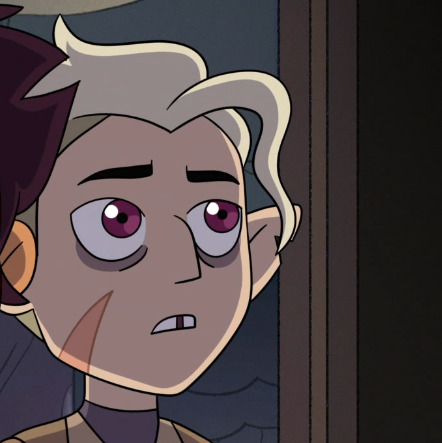
compared to
2. the sheer exhaustion and feeling of "What now...?" (see his upper eyelids below?) that set in, once he helped Willow find her parents and there was no more task at hand that didn't involve himself. His bright smile from a split-second ago has drooped and disappeared:

I know that right after the above frame, Darius and Eberwolf reunited with him, but his emotions are going to cycle up and down in the hours, weeks and months ahead. The elation from seeing Darius and Eber - people who were there to greet him when he expected nobody to turn up - is not going to last, though it will certainly come and go, because high-running positive emotions like that don't last as long, especially in the context of the life he's had as a child soldier. It's totally possible that on the same night, hours after this reunion with their loved ones, their emotions will shift drastically.
The tired look in his eyes above and the sad face he then makes, is in between two moments of him having something external to focus on (Willow and then Darius). I'm inclined to think that the above depressed look reflects a lot of the complexity that is going on underneath the surface. What is his state of mind when alone with his thoughts, when he has zero tasks to perform? How is he handling those thoughts?
There will be a deep, sometimes mind-numbing sense of bereavement over two significant figures in his life. First Flapjack, now this:

He used to love Belos. But I'm really not sure he can just uproot that love from deep within and discard it. Hunter carries memories like the following ones around which will be confusing to navigate on tougher days, despite being able to tell Luz "That's what Belos does, he tricks people". Because these were his formative years:

and something tells me that Philip was cunning enough to strike a delicate balance between being 'nice' to Hunter like above, versus unleashing his violent temper to terrify and harm him. Making sure that balance was so close to 50/50 that it would leave a child very confused. So confused he would rather believe he's never good enough rather than the more frightening prospect that his so-called family does not actually love him at all.
Hunter will have a moment now and then of still missing the 'niceness' that his 'uncle' showed towards him (felt in his heart and subconscious), while still knowing (in his head, rationally) that Philip was not genuine when treating him that way.
To note though, he did not witness Belos's death which reduces the severity of intrusive images that the poor kid would see in his mind.
What I'm worried about is how he'll handle the news about the grimwalker graveyard, since I'm sure that location is going to be scoured and Darius would want to give his mentor a proper sending off. They'd want to give all the Golden Guards and Caleb a sending off and pay their respects. This might add to what I suspect will be the messed up depression he'll fall into.
It will be very confusing and emotionally disorienting, literally not needing to worry about anyone killing him anymore. He has had no point of reference for this in his life at all. It might possibly the furthest he ever goes from that primal survival instinct he had while living in the Castle for so long, which took up the majority of his life so far:
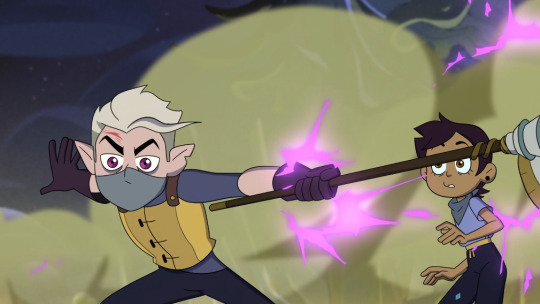
There will also be the added layer of how he feels about those first emotions. This is literally a concept called Feelings About Feelings and it's a key part of my work since I use the Satir Model in my style of counselling. We don't just feel emotions, we also tack on our own judgments and evaluations about them. E.g. shame about feeling anger, guilt about feeling sad because of burdening others, or even a combination like fear about feeling joy which can show up in healing from bereavement.
Depending on how we feel about whichever emotions got there first, it makes a difference because we could be adding or subtracting unnecessary suffering from the first emotion, especially if the first emotion is an already unpleasant one.
I have a feeling that we'd see Hunter look very very tired, till he makes breakthroughs in therapy. A tiredness that sleep, a healthy diet and exercise alone simply cannot fix. Because there's an entire upbringing in the Emperor's Coven to sort through in his head, this time not combined with the avoidance of having fled to the human realm and living under one roof with his friends.
The Hexsquad are not living under the same roof anymore, they are reunited with their own families with much to emotionally talk out, and the group no longer has a very urgent single collective mission. Sure, Hunter has an active role to play in rebuilding the Isles, but what about rebuilding his very self? He has the steepest climb, because we have seen the symptoms he exhibits.
Most of all, referencing a section of my Retraumatization and Self-Soothing (Part 1) meta (link), a memory as horrible as this:
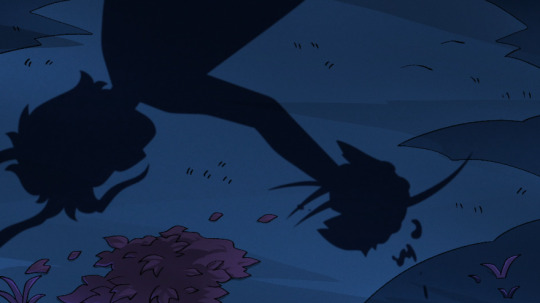
will likely be the most intrusive image is going to be replaying again and again over the months to come, and it may flood his thoughts during moments of being triggered or even out of nowhere during quiet moments for no apparent reason. It will be just like a broken record, where the same small excerpt of a song loops endlessly until the needle of the gramophone is repositioned.
It was remarkably poignant that his final words to Belos were "And most of all, I'm going to make sure you never hurt anyone again", and I'm happy with the story keeping it this way and understand why the writers likely made this decision - not just because the season was shortened. Hunter did not need to directly see or hear more from Belos in close quarters, not after his abuser minimized his needs for years, gaslit him, possessed him and got him to murder his best friend with his own hands.
It's more straightforward to make sure someone else isn't hurting anyone. It's easier to think of what plans to implement, when it comes to him protecting others: which he has had plenty of practice with. Because those are practical methods that we can see in action on the outside.
But here's the kicker: what about applying that last grand statement from his TTT speech to himself, emotionally: making sure he isn't psychologically hurting himself with harmful unhelpful thoughts and beliefs, after Belos's death? "I'll make sure I don't hurt myself (and by extension, my loved ones) again".
This will be very new to him, and it is a theme that I handle in pretty much every client case in my therapy work. The client's self-dialogue, the self-compassion or lack thereof. Which, in real life, is often not a concept that our own families and schools introduce to us to be familiar with.
For Hunter, this may translate into him making the decision to get help and truly accepting the gift of life that Flapjack gave him.
Basically this on a much bigger scale:

whereby in Flapjack's absence, he can truly believe in this new and positive fundamental belief about himself. The evidence that he managed to make it to that heartbreaking but incredibly beautiful place is pretty strong:

But before his happy ending, the pressure on himself to be useful to others via helping and working is likely going to come back and be used as his way of coping, and there's a chance it will cross the line into becoming a form of self-harm that he's relying on to avoid the frightening, deeper emotional pain. People around him know him well enough that they'll be able to spot his behavioral changes and then sense he is not going in a helpful direction. They'll see that it's hurting him even though it's the most familiar territory for his mind to be in, and someone is going to tell him to change that.
He's going to be seeing his friends with their palismen. How will it be like being among them, even if they are pretty good at supporting him? How would he attempt to make sense of the void that is the absence of the incredible love he experienced from that first friend, the absence of that mental link between witch and palisman?
What emotions could be lurking beneath the surface? Believe it or not, there are some signs from Luz's nightmare even though yes, Hunter was being controlled by The Collector. I wouldn't quickly dismiss this dark Flapjack-related scene as 100% being about The Collector's goal to scare Luz in the nightmare.
I think there was a smaller subplot going on as well.
The Collector needed material to work with in the first place, to perform the puppet acts: the material was whatever fears and whatever pain was already there in their targets.
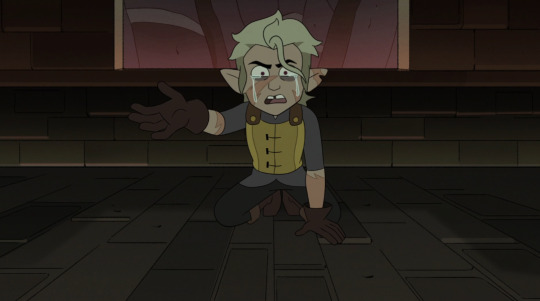
The Collector didn't create Hunter's emotions from scratch for the puppet act; instead he manipulated and redirected what existed at the base level. All this wouldn't work as analogies of mental illness vs. mental health if The Collector could just engineer emotions on their own and simply replace whatever his puppet targets were already feeling. Emotions never vanish and always take up space somewhere, they are redirected, transformed or channeled into outlets even if it means they become repressed or locked away. But they never stop existing.
I have a feeling that despite the nightmare being Luz's, despite Hunter being used as an instrument for The Collector to achieve their goals...the pre-existing emotions that Hunter himself felt in his body, not puppet!Hunter's verbal responses towards Luz, were true. He is a haunted boi.

This face he makes above might be a hint at the worst of his pain. It might be the furthest he has felt from when he said "I like who I am right now" to Flapjack. In the place of that confidence from before, there might now be his own version of Luz's "I'm as bad as Belos". I cannot be entirely certain, but the negative belief that may have taken root in him could be "I am not deserving of the life Flapjack gave me".
Interestingly, if this is the case, it could easily parallel his line from all the way back in Any Sport in A Storm: "I'm unfit to wear the sigil of the Golden Guard." It's definitely a possibility, since Hunter is now faced with having a lot of time and space now, and less urgency than he's ever had in his life, to think back on all those times he helped to further Belos's cause. Especially when it came to sending many palismen to their deaths.
With his own palisman now dead, the engraving we would eventually see on Flapjack's grave: "Thank you for finding me", would be the destination. But the journey needed to reach that destination of amazing gratitude in the first place...must have been a harrowing one. In the early months of the acute grief, it would've been more like "Why did you have to find me?! You shouldn't have. Then none of this would've happened". Not forgetting the number of times Hunter has replayed in his head what he could've done differently, trying so desperately to rewind the clock and make that better alternate timeline a reality.
If you remove The Collector and even Luz from the equation in the Luz nightmare scene, Hunter may well be having such responses - the ones that puppet!Hunter directed at Luz to blame Luz - as a dialogue with himself. He might direct those negative emotions towards himself since he's so careful about hurting others and has taken on unfair punishment for so much of his life.
Even when he was temporarily himself, smiling, expressing a positive emotion to encourage Luz with "What's the first thing you do when you wake up from a bad dream?", that was him conversing with another person, someone external. Not his own self. I am willing to bet he wasn't at a point in his arc where he would smile at himself like that and easily encourage himself in the same way.
While we can be certain he had already reached his breakthroughs by the time we saw him post-timeskip, he has not experienced them yet in the frame above. He has not felt (yet) what Luz felt onscreen when she had breakthroughs in relation to her moral injury:
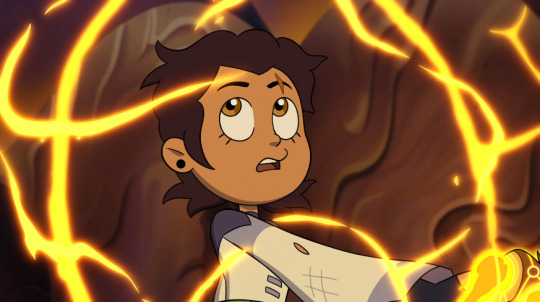
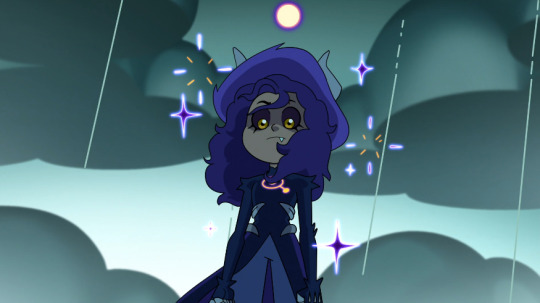
Taking a leap of faith to accept the Titan's gift, to trust that he chose her because she has a good heart and will never be Belos.
Then later, being able to stand firm, believing she truly is good ("I am the Good Witch Luz!"), and not uttering a word to Belos as he died - which was post-traumatic growth beyond how she broke down under his threats and manipulation towards the end of Hollow Mind and later in King's Tide.
Recap time. In the (quite likely) long period that passes by before we meet his new palismen, he's likely going to want to jump into action and attend meetings with Darius, Eberwolf and co, help to physically rebuild things and organize people with his own Coven Head experience. Leaning back on the ingrained and familiar lifestyle of pouring himself into work and gearing towards burnout is certainly a risk to watch out for.
The Hexsquad, CATTs and the Clawthorne sisters are going to notice his behavior and likely urge him to get appropriate rest and seek help.
However, there is the other extreme: Belos isn't around anymore to torment him, and Hunter would know this in the rational sense (head knowledge). Which leads to the possibility that he may swing towards shutting down as opposed to overworking tendencies. He would feel allowed to do whatever he wants, in this new Boiling Isles, and he had months of opportunities to do that in the early part of Thanks to Them before Belos's return.
What I'm getting at is, if he didn't sleep enough before, he might swing towards sleeping too much after finally collapsing from the familiarity of survival mode into unknown but genuinely safe territory. If he cared too much about helping others before, he might swing towards a depressive state of apathy (the closest canon reference point would be him digging his grave: he was very disarmed in that scene to even think much about helping anyone including Belos). This is why the screenshot I used of his smile drooping in The Collector's Palace, feels like a big clue to me. This would be where Darius, Camila and other adults have to seriously keep watch over him.
In the Cinema Therapy episode I had as a small reference for this post, the licensed therapist who hosts the series mentions that "It takes a lot longer to put oneself back together than it took to fall apart." In Hunter's case, the "falling apart" period here refers to that collapsing I mentioned. It would be the time between:
1. the grief hitting him in full force: when he subconsciously understands and acknowledges that Flapjack isn't coming back (which...will involve hell of a lot of wailing and sobbing. Him having a full version cry of those first few tears he shed at the end of TTT),
and
2. the time when the painful shock from feeling the full force of the grief has decreased enough that it plateaus.
This falling apart stage may need to pass before he seeks therapy. If he tries going for sessions while still going through that shock and pain, it might be too much for him.
As terrible and sad as it sounds, a deep dark spiral like this might be necessary. It would be his body and mind wanting to compensate for several years' worth of unnatural hypervigilance which wasn't serving him in a advantageous way (i.e. surviving) any longer. His body and mind begging for rest at last, to try and make sense of everything that happened. This big collapse into depression would empty out the old and free up much room in him for new stories, beliefs and perspectives to take root. Depression is, after all, the body's attempt to (maladaptively) try and protect us by numbing us, or else we would be overwhelmed.
As someone whom we know keeps himself very busy, this could be the period where he is the furthest he has ever been from that old simpler life. Because his CPTSD-ridden body would be demanding more than ever that he compensates for a childhood and teen years' lack of general rest, he may not even have the strength to cope the way he did before. The only way he might possibly cope in this period is to go with the flow of that raging current and do exactly what his body is asking of him: getting real rest.
Like what happened with Katniss in the Hunger Games trilogy, this early grieving stage would emotionally be difficult and terrifying, like walking along a tightrope, finding balance between left and right to angle yourself as straightly as possible and walk forward. (the tightrope metaphor is what I use with some of my clients to explain swinging between extremes of coping mechanisms).
The missing pieces of the puzzle in his arc, in the 4-year duration before the timeskip, might be his own version of these points in Luz's arc:
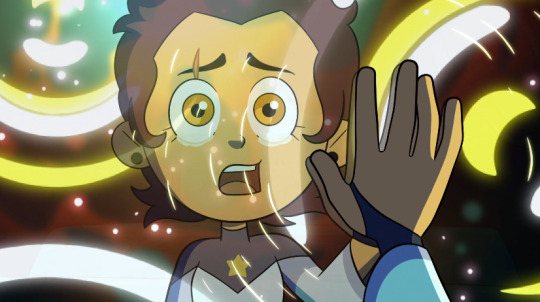
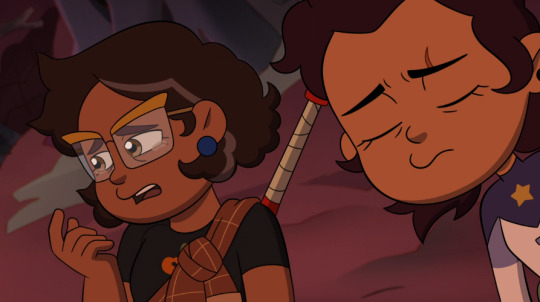
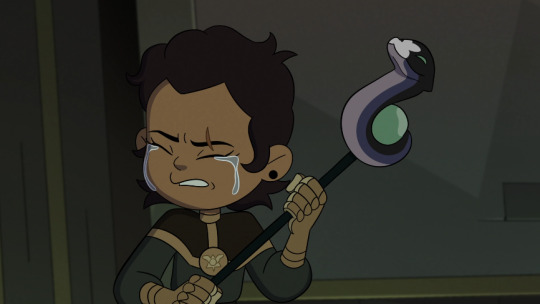
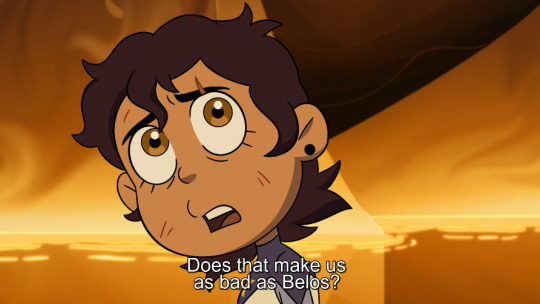
where she sank lower before she realized her deepest wish and emotionally experienced her worst fear in her Watching and Dreaming nightmare.
For Hunter, these could look like the following:
Like Luz saying it'd be better for everyone that she permanently stays in the human realm, Hunter might say he wants to remove himself from his loved ones in some way, for good. Whether a literal suicide attempt (like Katniss from The Hunger Games) or not, I can't say for sure.
A parental figure trying to reach out to him, saying he is deserving of Flapjack's gift. But he still struggles to believe that. What matters though is this parental figure is present and he's not pushing them away.
Him hearing some confirmation of his deepest negative belief about himself, in his own nightmares. Like Luz hearing the most terrifying things she could ever hear - Amity's "You've been the real villain this whole time" and "But for the sake of everyone you hurt, I challenge you to a witch's [duel]".
Him being able to reach an emotional space where he can begin to question that unhelpful belief: "Am I really deserving of Flapjack's gift?", or something similar.
The big moment when he finally tells someone how he really feels about the possession, Belos's death, Flapjack's absence in this new supposed peace and quiet....this would be the important invitation for the other person to connect and meet his emotional needs, and is a lot like how support groups for addiction work: a client needs to acknowledge that they are struggling with a problem, not avoiding it with distractions any longer, and then seek help and express their need for said help.
I suppose the question is how soon Hunter might decide to accept professional help and give it a go: or whether he'd have the genuine need for space first and say "I need some time". Because one's rational mind can be ready to go for therapy, but their subconscious and body would find it too unpleasant if it's too soon. Every part of him would have to be ready to begin putting himself back together after the falling apart stage occurs.
The messed up experience of CPTSD is that you stay shockingly calm during real danger, but on the flip side have big, disproportionate freakouts during actually safe times. Compare how calm Hunter was when he smiled at Luz in her nightmare while he was tied up with puppet strings vs. his fear and shame when he couldn't save Luz in Clouds on the Horizon.
In a CPTSD memoir I read, the author describes that it was horribly frightening to hear her partner be in a bad mood and wash the dishes more loudly than usual, while during the pandemic, she felt completely calm seeing empty shelves in a supermarket when she struggled to get supplies.
From my own experience, I have experienced being pretty damn calm when bleeding out and needing hospitalization. But in a different year before that, I recall one afternoon alone in my house right before a vacation where a strong gust of wind very loudly slammed an open door shut next to where I happened to be standing, and I broke down sobbing from a retraumatization via an emotional flashback. Because it felt extremely real as if my abusive parent was lashing out to physically hurt me.
After a 5-year period of mostly being in talk therapy, and then a 2-year period of regularly scheduled EMDR therapy, my response if I have a door loudly slam shut near me now would maybe be a smaller-scale flinch and a flash of anger that would last about maybe a minute. Which is miles better than sobbing for half an hour and being dissociated and frozen in a memory for hours before I thaw out of that flashback.
Since the show's writing is just that good, I could look at Luz's depressive symptoms manifesting in Thanks to Them and see a likely parallel in Hunter's story moving forward, since we know how much this show also digs neat and tidy parallels. These are characters written for TV after all, so they'd have to fit a formula to an extent, to have compelling arcs and reach high and low points along said arcs.
Part 2: Therapy Itself
Part 1 was the setup to give a good amount of context: now for the technicalities of the therapy sessions themselves:
Like Adrian Graye said in Labyrinth Runners, Illusion Magic can sort through memories. We have seen from Gus's own powerful Illusion abilities that he could do so with Belos. It makes sense that a therapist does this in sessions to have a magnified version of how in our world, therapists exercise empathy by imagining what it is like to be their clients:

I would monitor whether his mood (what he is feeling within) and affect (how the emotions appear on the outside e.g. tone of voice, face expressions) are congruent. Congruence usually means a client is in less distress. Incongruence might mean they are in so much pain that they can't connect directly with the main emotion: the perfect example of this being Hunter laughing when digging his grave.
We therapists take note of aspects such as affect, mood, the client's motor activity, any indicators of psychosis, even down to things like how untidy their hair looks in case we get clues about the severity of their issues (this is called a Mental Status Exam, and we write what we see in our case notes per session).
Because CPTSD is so relationship-centric, I'd discuss how he's getting along with new parental figures (the Belos replacements who will heal him so much and change his life forever!) and friends.
If the Boiling Isles therapists use their own equivalent of EMDR therapy, which is theorized to be like a waking version of how REM sleep and REM-related dreams help our brains to sort through memories, it sounds like a great fit for his case. This intervention involves subconscious work and could help him reshape how he experiences memories of Flapjack and Belos. EMDR clients are expected to see vivid images popping up without control in their mind during the sessions, and they are quite symbolic e.g. seeing a grey sky often indicates grief, seeing lighter colors indicates more calm. This technique helps a client's subconscious rewrite their story the way they'd like it to be, and install new positive beliefs and emotions over time.
My own example of EMDR experiences from the second half of 2019 as a client, is it majorly changed how I related to my own abuser, got me to finally feel allowed to emotionally break away from her, even though she is still alive and even lives in the same building.
In the early sessions, I saw an image of my 5-year-old self being forced to wear an ugly grey apron that my abuser used for baking. The apron is a real object, not fictional, and the emotions I felt showing up were matching with the image: feeling very uncomfortable seeing a visual representation of my abuser's hold over me.
But in a later session after a few months, guided by my therapist, I saw a vivid image of my abuser receiving a sea burial. She was lying peacefully on the water surface and sank down until she was gone. That was me subconsciously burying any expectation that she could ever provide what I needed. This was so powerful that I could go home after that session and permanently (so far) be significantly calmer around my abuser.
Therefore if Hunter goes through something like this, he'd potentially be able to put Belos to rest and have it feel very real and true: and have significantly reduced distress about Belos-related memories. There is the potential for powerful breakthroughs for him here, especially also related to Flapjack's death and how challenging it might be to carve palismen in the beginning. Especially since in the worst case scenario, even touching palistrom wood might be enough to badly trigger him. I cover this particular point a bit more in my other meta, Retraumatization and Self-Soothing (Part 1).
We would also be discussing what he's implementing into his routine and what may benefit him. I would be seeing if he is able to laugh about things, be motivated enough to be outdoors and among people, experience pleasure when creating new things, and form closer bonds with parental figures (what I just listed is to do with neurotransmitters in the brain that increase mental health: serotonin, endorphins, dopamine and oxytocin).
If I were his therapist I might suggest that whatever volunteering tasks he does, he carries those out with his friends, and time should be allocated to managing and taking care of a specific demographic: children. Because I think it'd be a safe, low stakes form of unfamiliarity for him to have enough emotional distance from his traumatic memories. Early months of acute grief usually require such emotional distance.
Having a good dose of an environment like that alongside the other tasks where he's working alongside Darius etc, could help him because kids' emotions are less complex, and their infectious laughter and fun-loving nature may play a role in helping him be more open with his own inner child. His therapist would be seeking to draw out that inner child in their sessions, and that little child would need to feel safe enough to emerge.
Importantly, his future palisman: it would've been interesting if he did what Luz did with Stringbean and allowed the palisman to be whoever they wanted to be...that would've been a nicely organic process. But even if he had a good idea to incorporate a Flapjack-like design but change details like the color, I'm sure he thought it through very well. I'm certain that this was a major topic of discussion at some stage of his therapy. Discussing the guilt he'd feel about replacing Flapjack vs. still taking Flapjack with him in a new way.
Coming from a strengths-based angle: paying attention to which of his individual strengths he is shows and recounts in the session. If he needs reminding, I could give him a simple worksheet listing various positive qualities and ask him to circle/colour in which ones he feels he has, which then prompts further discussion and questions. Lastly, a powerful tool called reframing e.g. if he says he's worried about being a nuisance to his friends, I'll point out how much he cares about their comfort and affirm that place of kindness.
Work on inviting self-compassion into how he sees himself. Is he able to view himself the way he views his friends? If he remembers the encouragement he gave to Luz about "turning on the light", I would ask him what that would look like in his own life, symbolically.
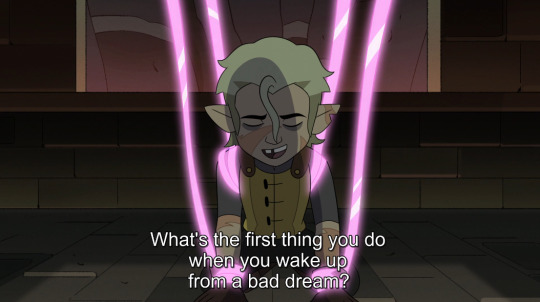
Hunter's own life has been a really really bad dream for a very long time. He himself has to reach for that light switch and choose to heal by embracing Flapjack's ultimate gift to him.
And we can rest assured that Hunter did that.
Because this post-traumatic growth right here?

This looks like multiple breakthroughs have taken place while he's been receiving consistent care from an excellent community. And there's no way it was an easily won victory. It has been very much hard-won, after how dark the story became in Hollow Mind and Thanks to Them, and it looks like whatever breakthroughs he had left him pleasantly surprised.
It doesn't seem like his heart and soul can contain this much joy and hope, without a very painful dismantling to have taken place first, to make room for the most unexpected treasures to fill his life back up.
The joy becomes even greater if you never would've expected it in your wildest dreams.
759 notes
·
View notes
Text
Submitted Prompts #158
Sorry if this isn’t the right place, I have only recently discovered this tumblr and am slowly working my way backwards through your dpxdc tag. I think it might be an injoke here so uh, behold poor Yorick, totally not the human skull of Tchaikowsky fullfilling his actor dreams postmortem.
One of the posts in the tag was a dpxdc trope writing challenge. So I’m not sure if you’re interested in seeing blurb turned fic summary but here:
Nightwing learns of a travelling circus, Circus Gothica, that claims to have ‘The Real Flying Graysons performing from the beyond the grave’. Alternatively furious and hopeful he discretely goes to investigate, and finds himself overshadowed by one of Ringmaster Freakshows ghostly workers, stuck performing as an acrobat for the circus. As Nightwing struggles with his posession and reunion with seemingly the supposed ghosts of his parents, he finds an unlikely ally in Killer Croc/Waylon Jones, who had been kidnapped on his travels back to Gotham after having tried and failed to settle down in Swamp Things swamp.
Unfortunately the pairs cooperation ends shortly after freeing themselves and the completely unneccessary fight allows Freakshow and his assosciates to escape. Nightwing is determined to solve the case himself (and get justice for his dead parents and himself) causing tension between him and Batman who noted his disappearance.
Batman independently investigates,leading him to the Guys in White. Identifying them as an anti-meta group, he brings it to the attention of the Justice League in hopes of organising a legal solution - Superman takes it personally when one of the primary funders is revealed to be Lex Luthor.
Meanwhile Nightwing has tracked Freakshow to a bolthole/lair, where he comes across Val, a woman in a red jumpsuit, who had been following the trail of a different individual - a villain she calls Vlad Plasmius . The pair work together, Val freeing the ghosts in Freakshows control including the Greysons and Nightwing getting a cathartic takedown of both Freakshow and (with borrowed tech) Vlad.
Their partnership and the greater plot behind the villains actions goes over Nightwings head as he recognises 'not his circus, not his monkeys’ and opts to leave it to his new friend.
Meanwhile Clark Kent has discovered an odd exchange of info/money/tech between the GIW, Lex Luthor and a strange inventor who loudly proclaims that he is Technus. The end goal seems to be to create suits that will be secretly under Lex Luthors control capable of rivalling heroes, so as to supplant heroes as beloved protectors of the world, as a step in ridding the world of independent metas like superman and getting him his own private world army.
Also meanwhile Batman has continued to investigate GIW/Freakshow leading him to Amity Park, where he witnesses young adult Sam Manson inadvertently vitalise plants during a local eco protest. When persistent digging leads to learning about the overgrowth incident, Batman reaches out to Harley for her thoughts on how mentorhip might positively/negatively effect her struggling but mostly reformed partner Poison Ivy. Batman uses his Brucie Wayne persona to assist in organising an eco activism initiative (and plant meta power mentorship) with the Mansons, with Sam taking a guiding role.
Supermans battle against Lexs + Technus mediated ghost/meta power suits goes poorly and he calls in for rescue. Recognising the issues from his research in Amity, Batman 'borrows’ tech from the Fentonworks before going to the rescue.
With the day saved Batman returns to update his records on ghosts and store his new tech, finally leading to Nightwing explaining a bit of his experiences to add to the records.
The story ends on the cliffhanger of Danny getting screwed over by Batman’s improved antighost protections when he went to try track down and collect the stolen weapons.
I had fun with this : )
121 notes
·
View notes